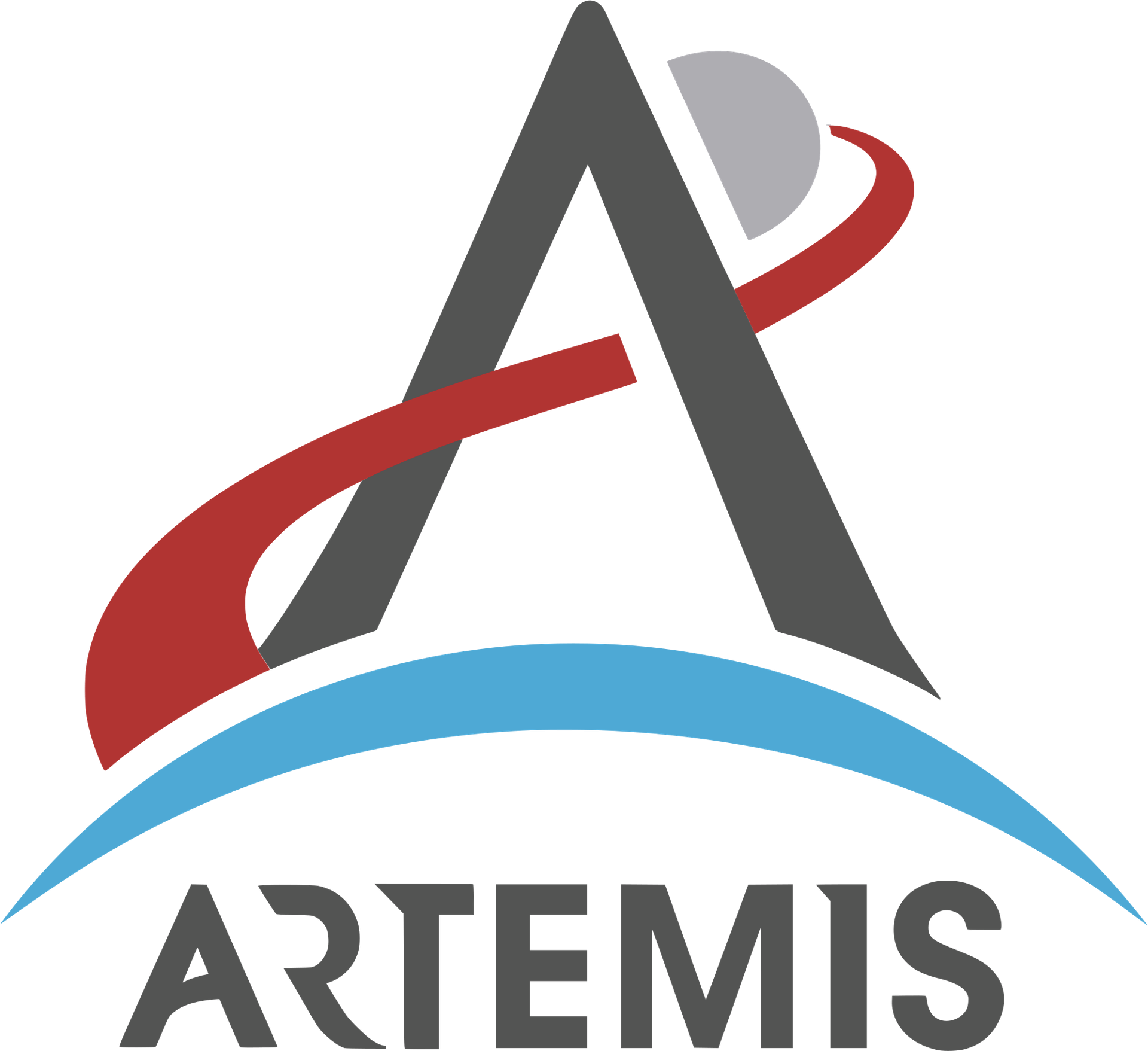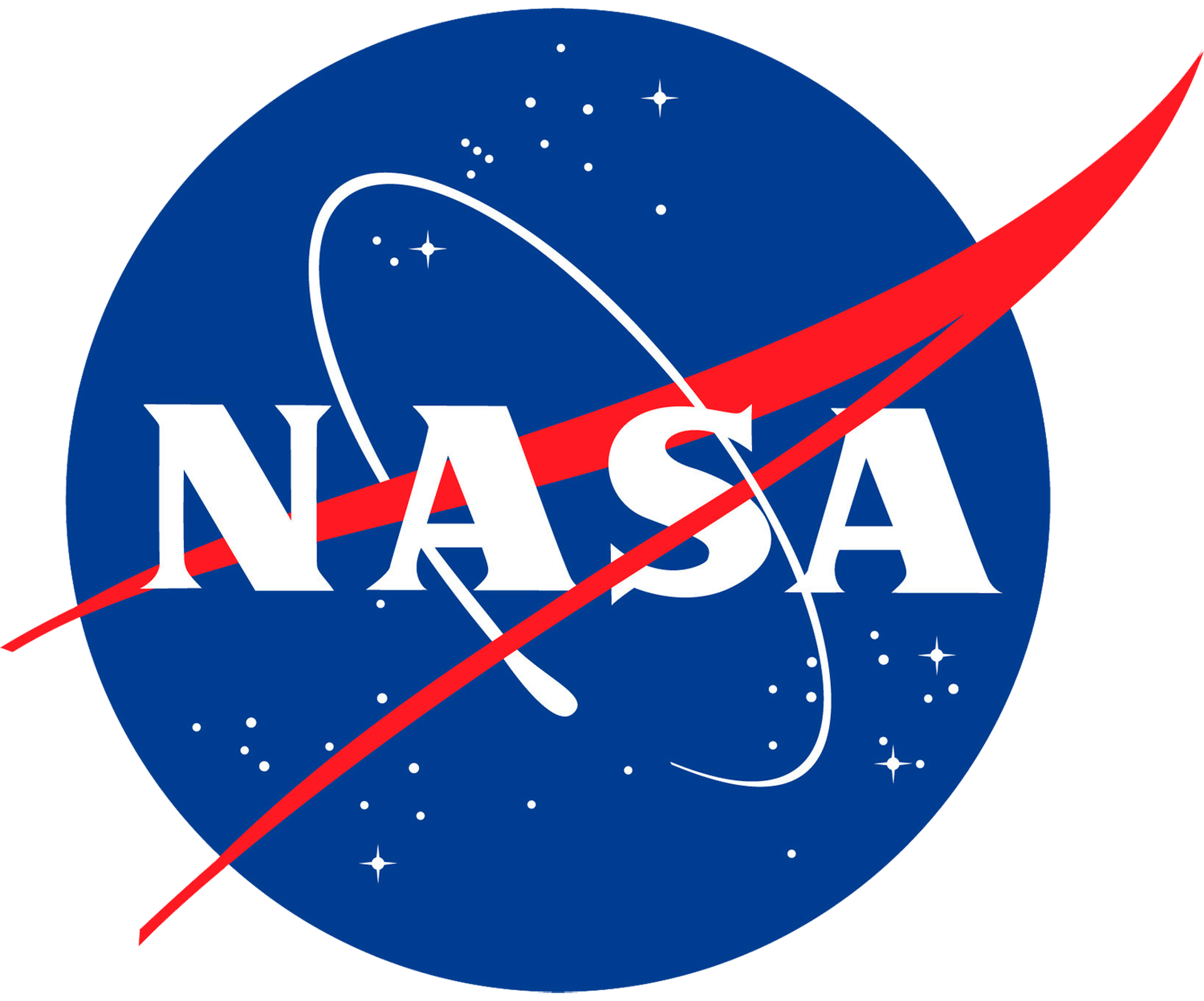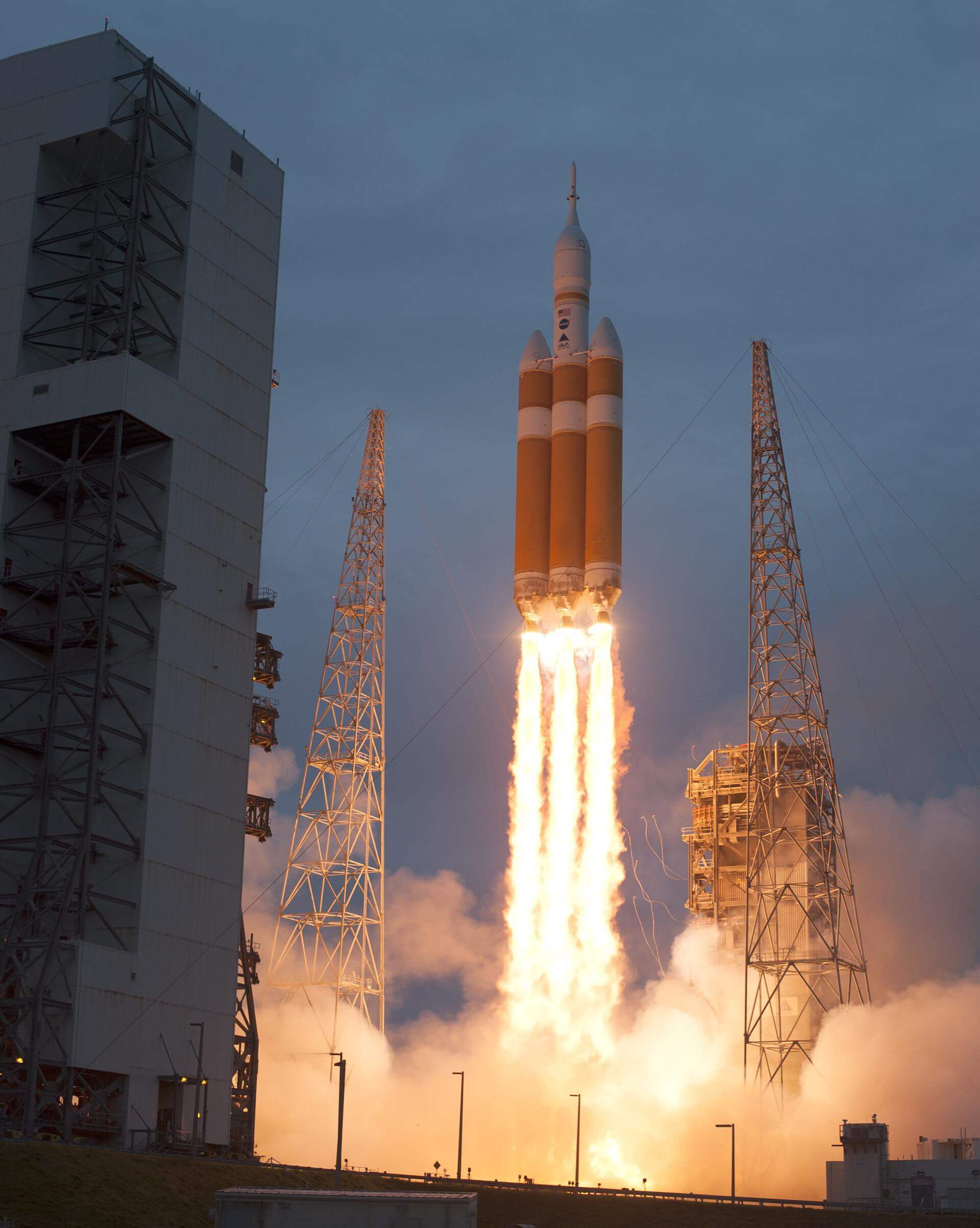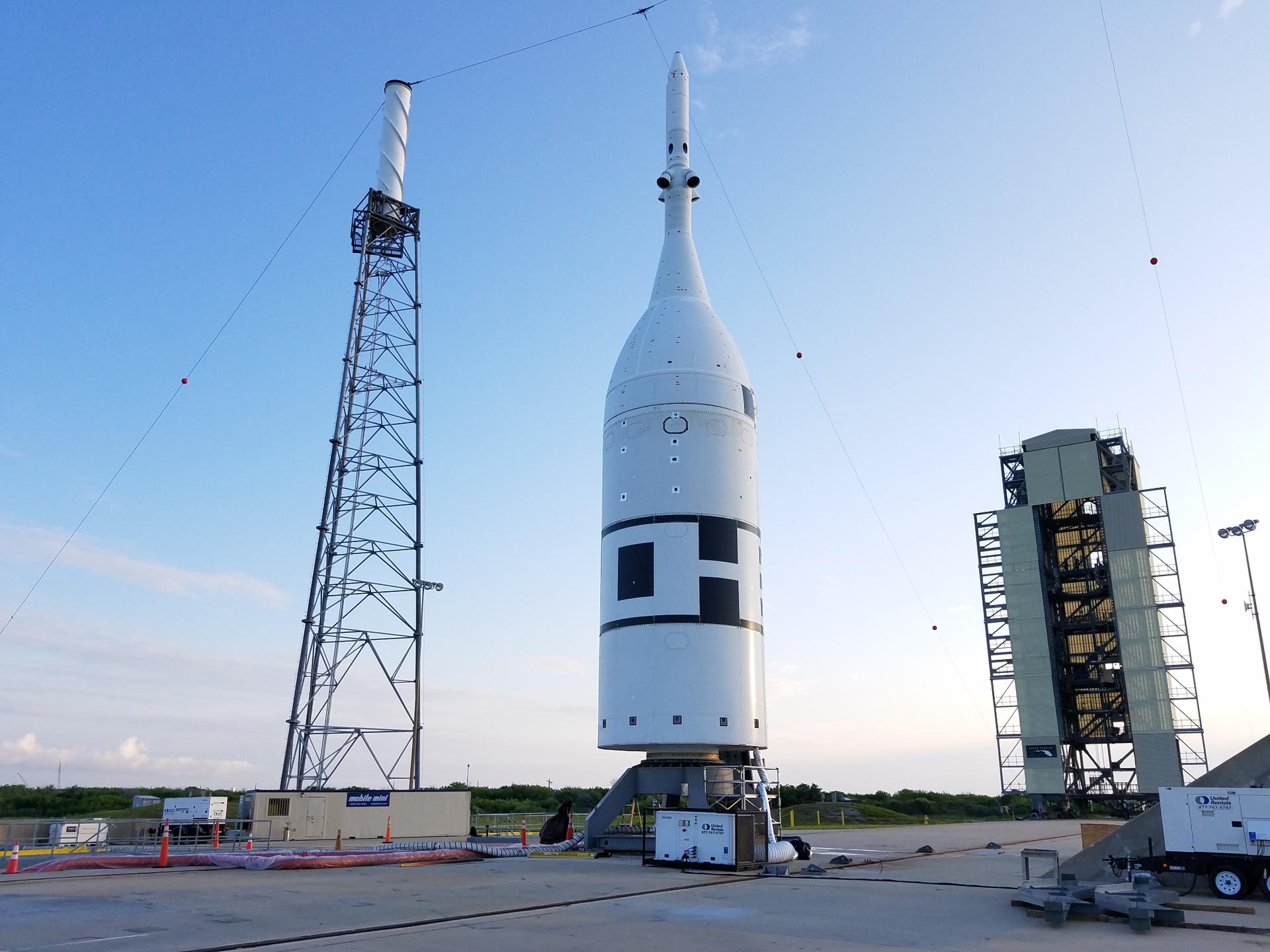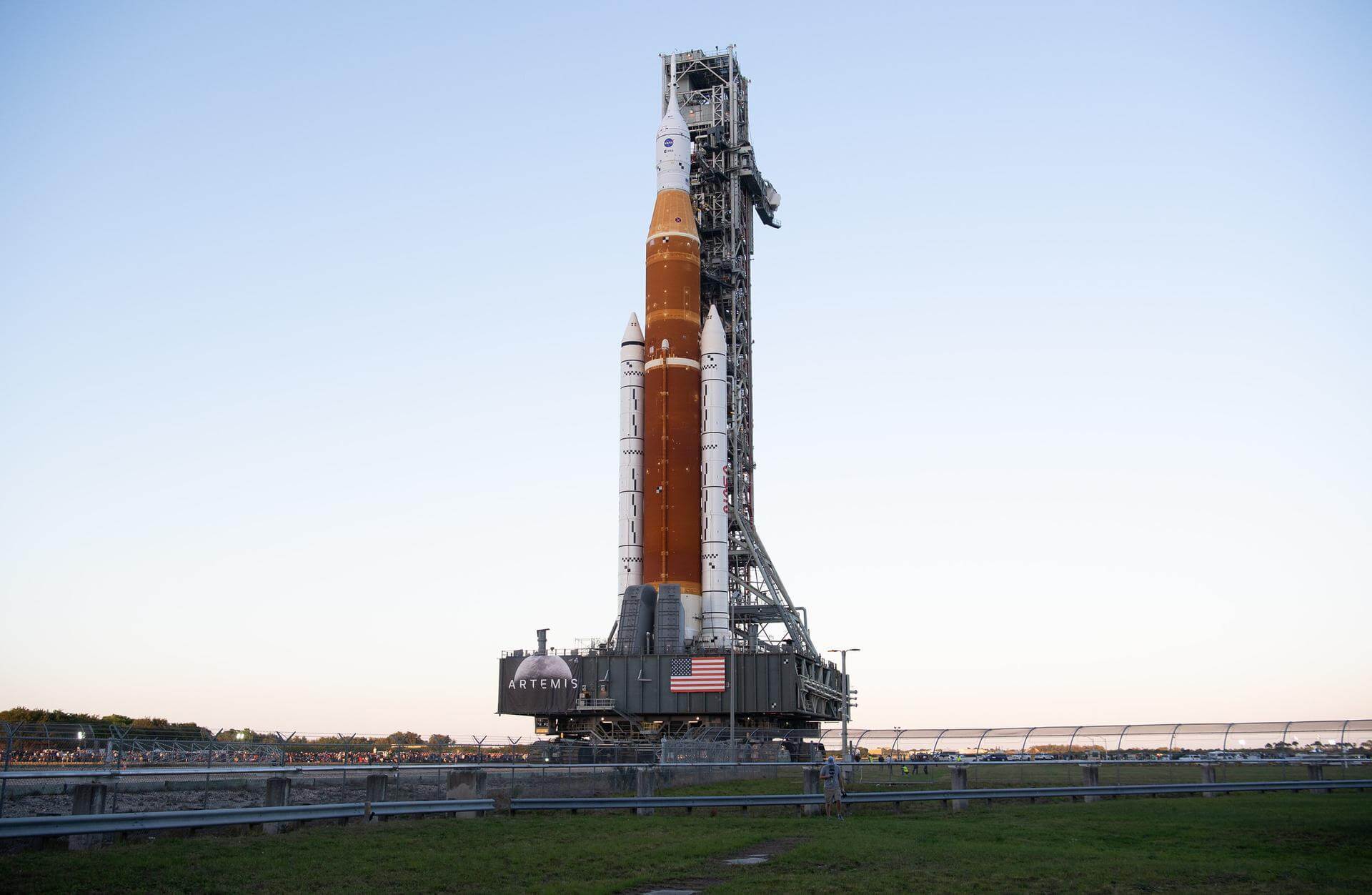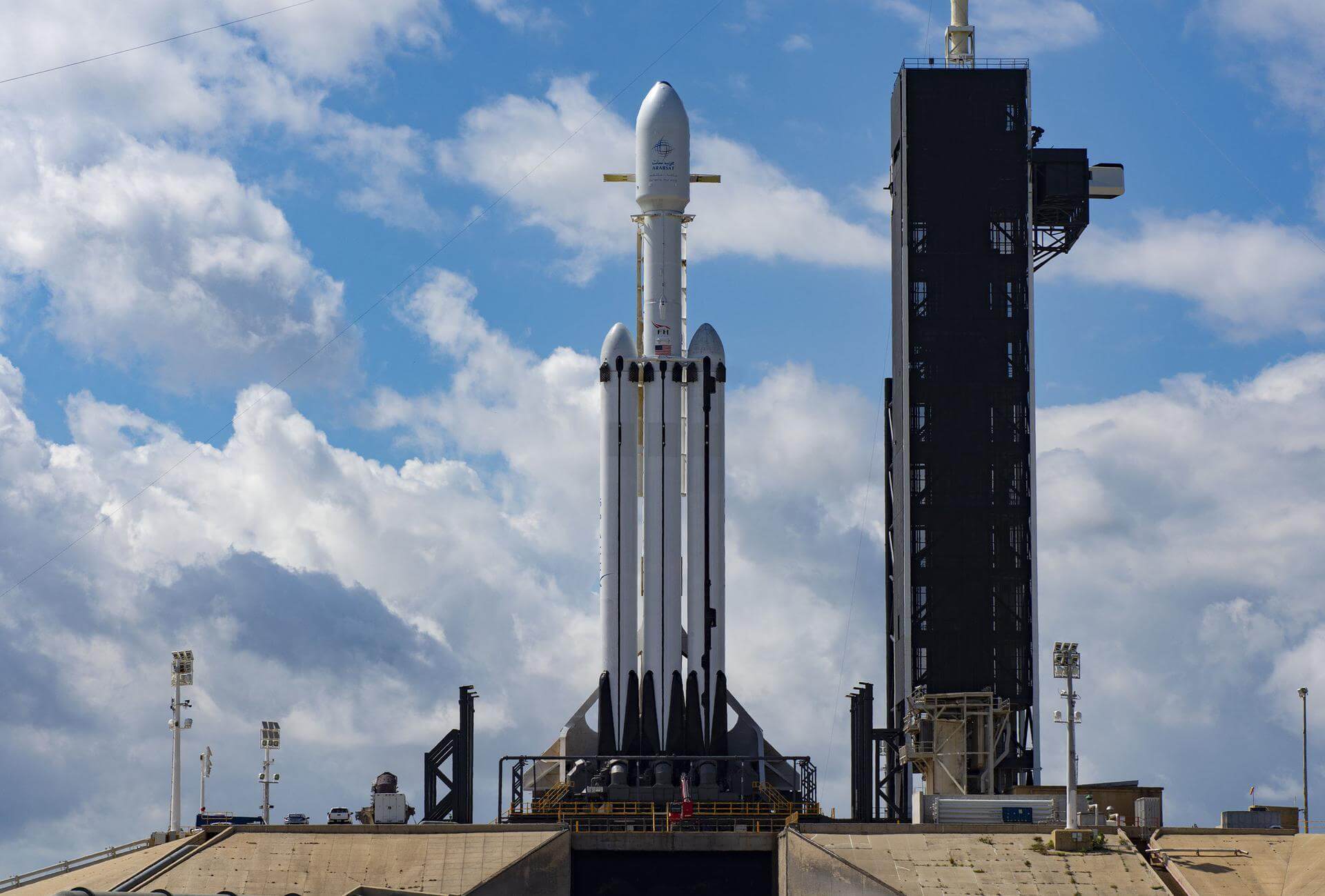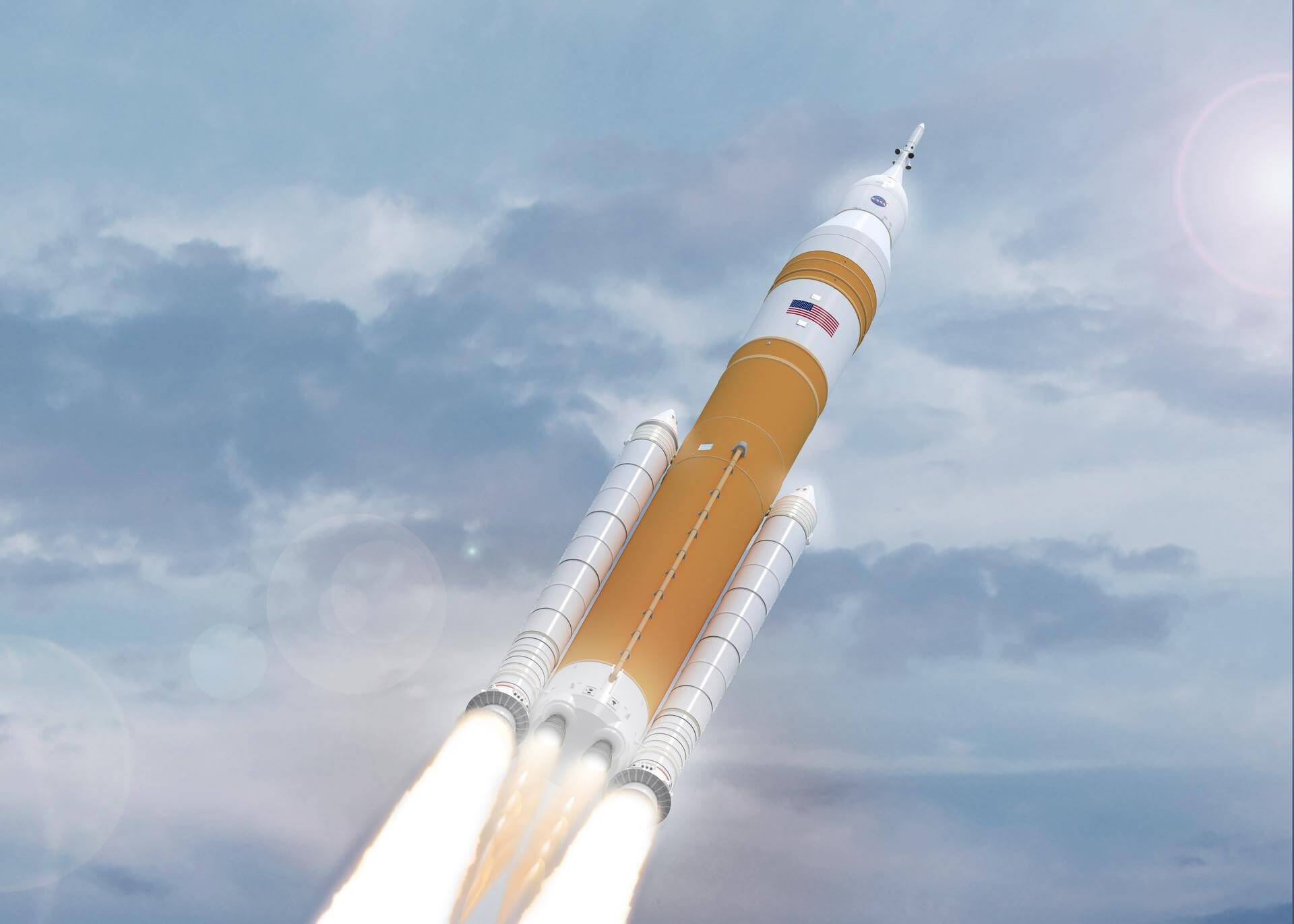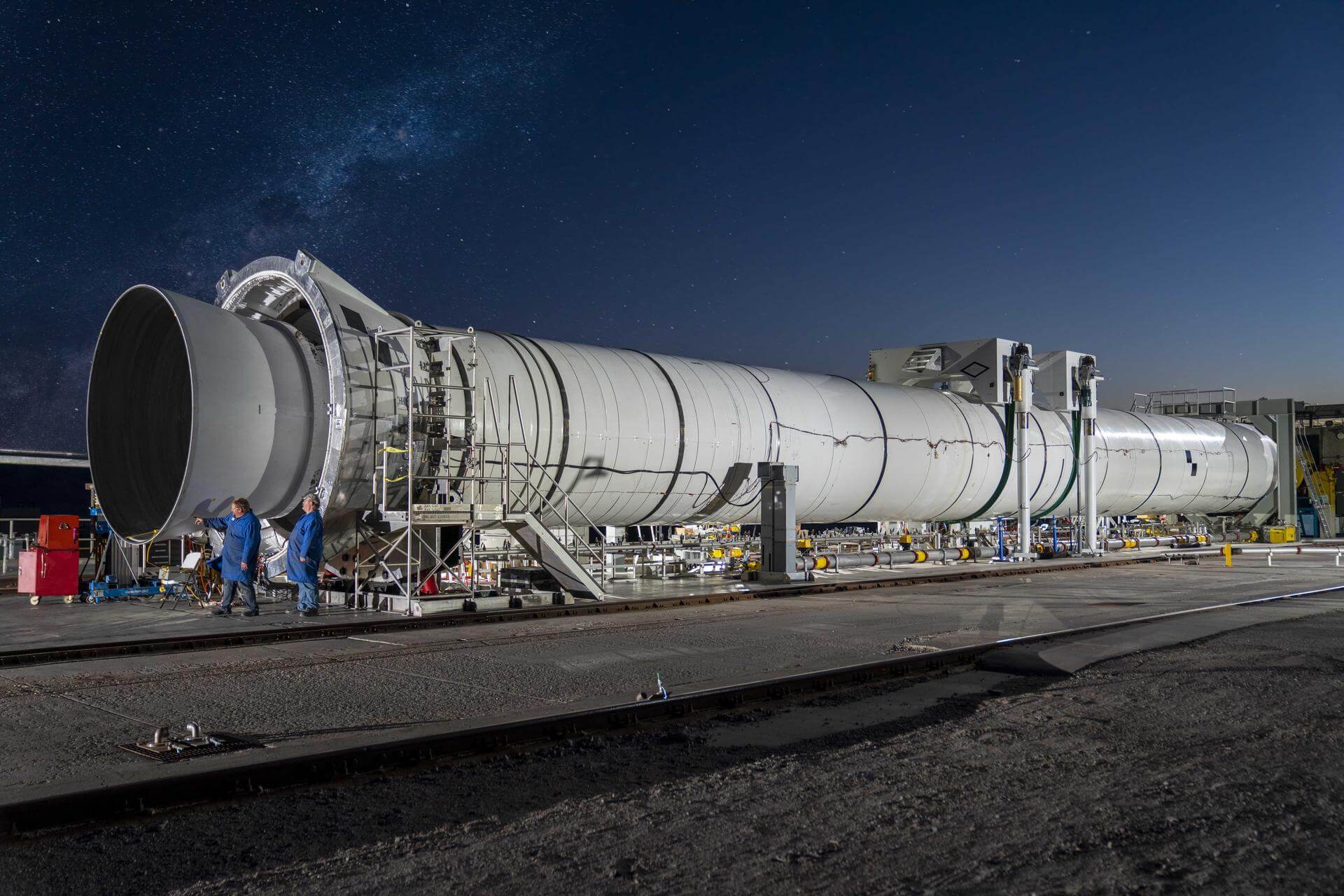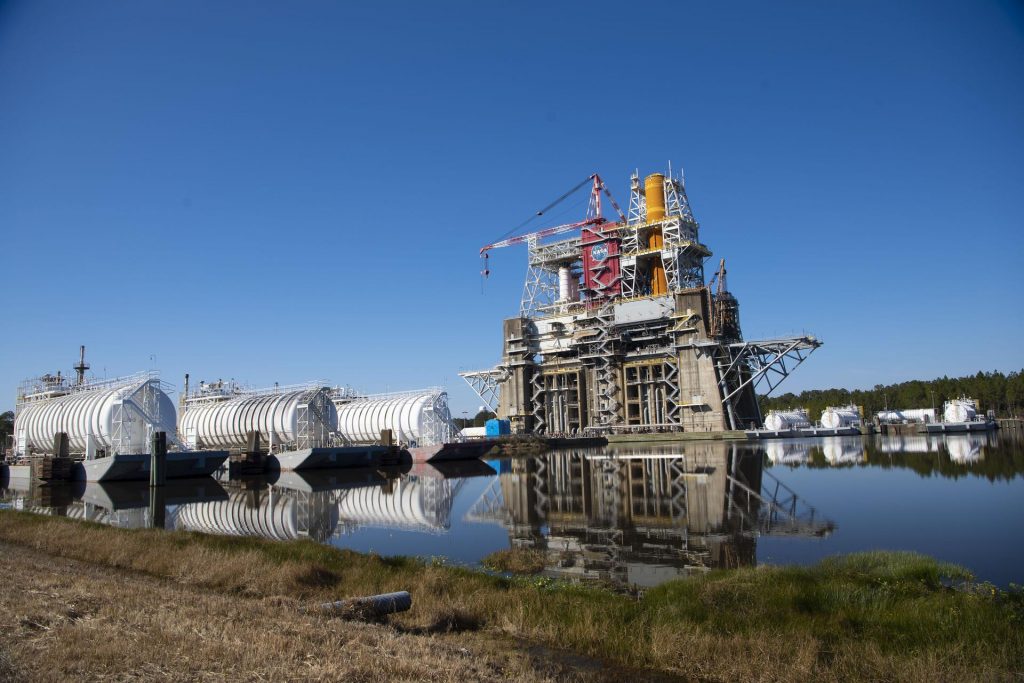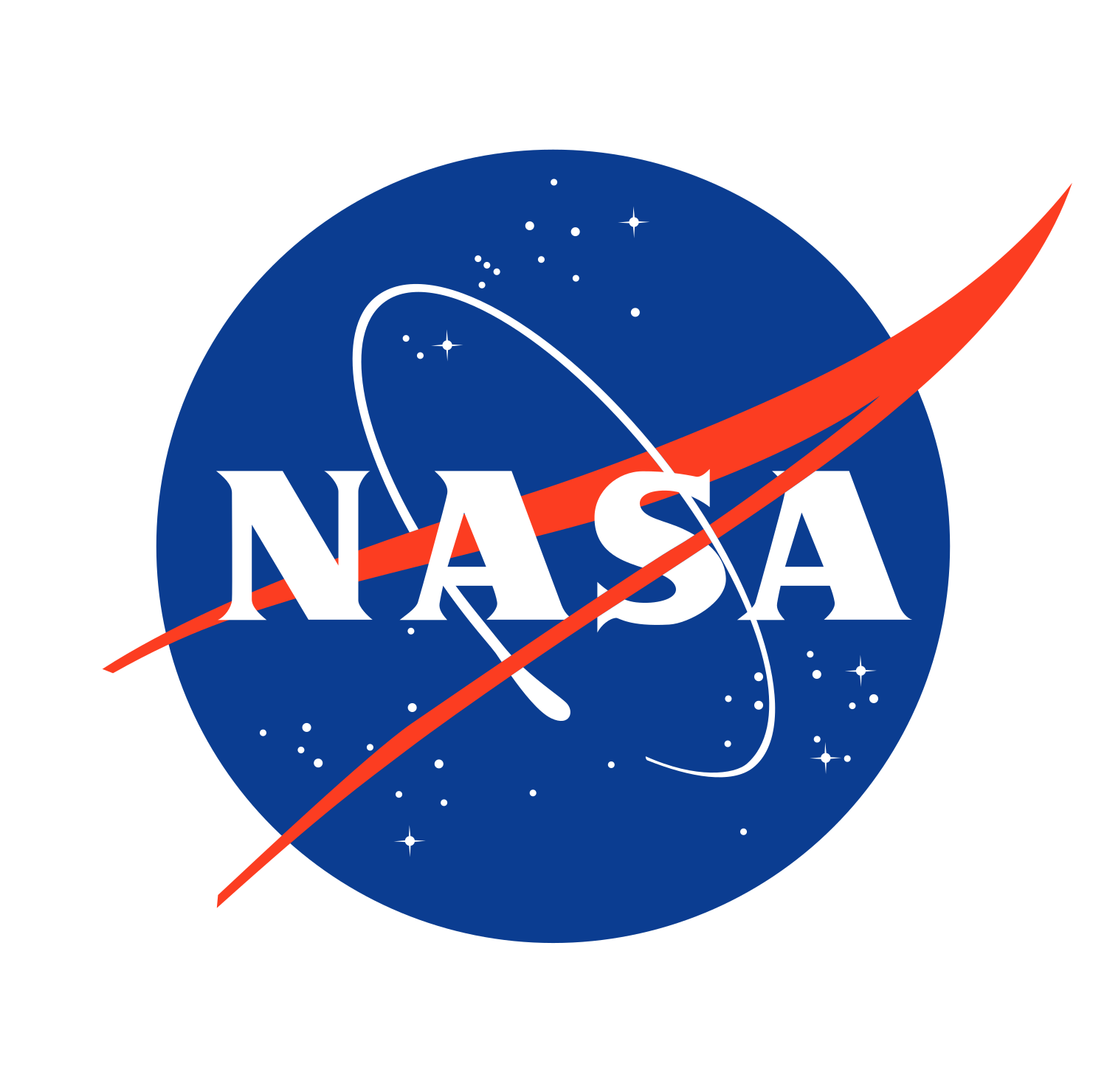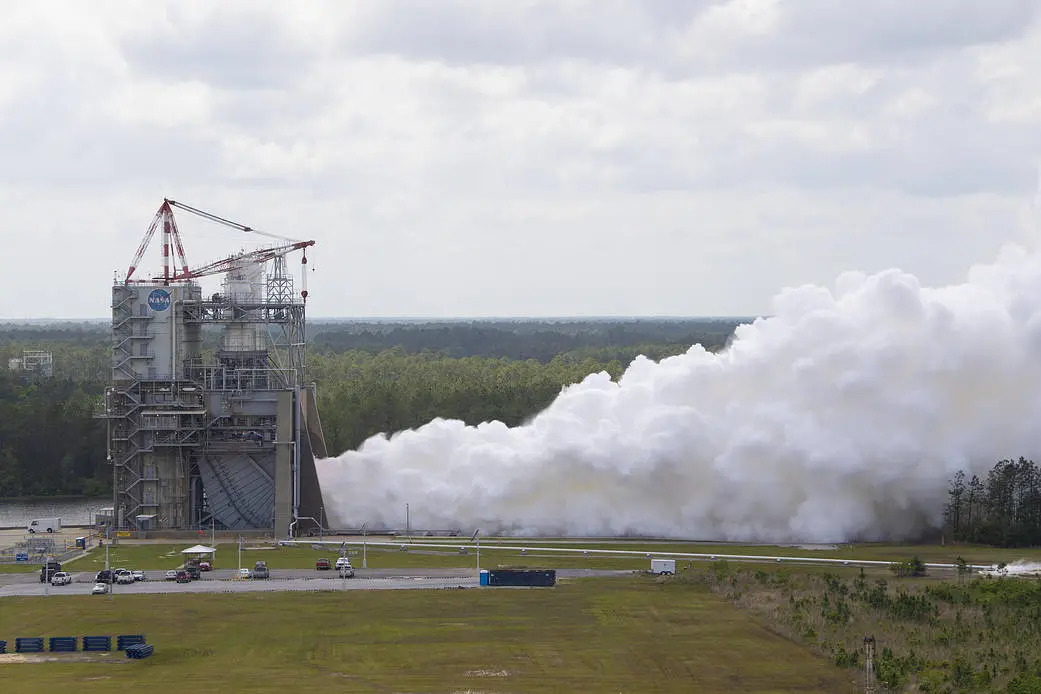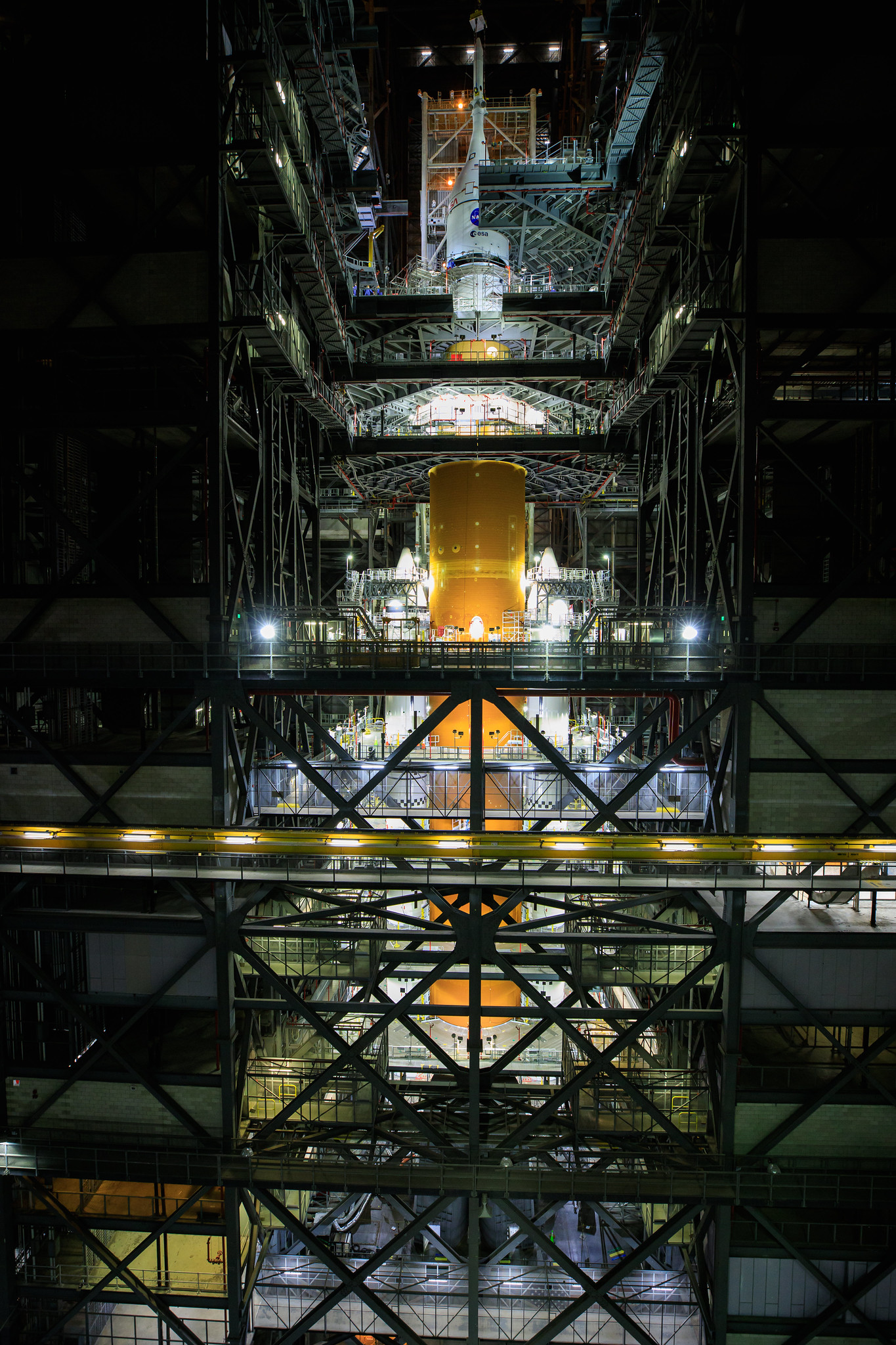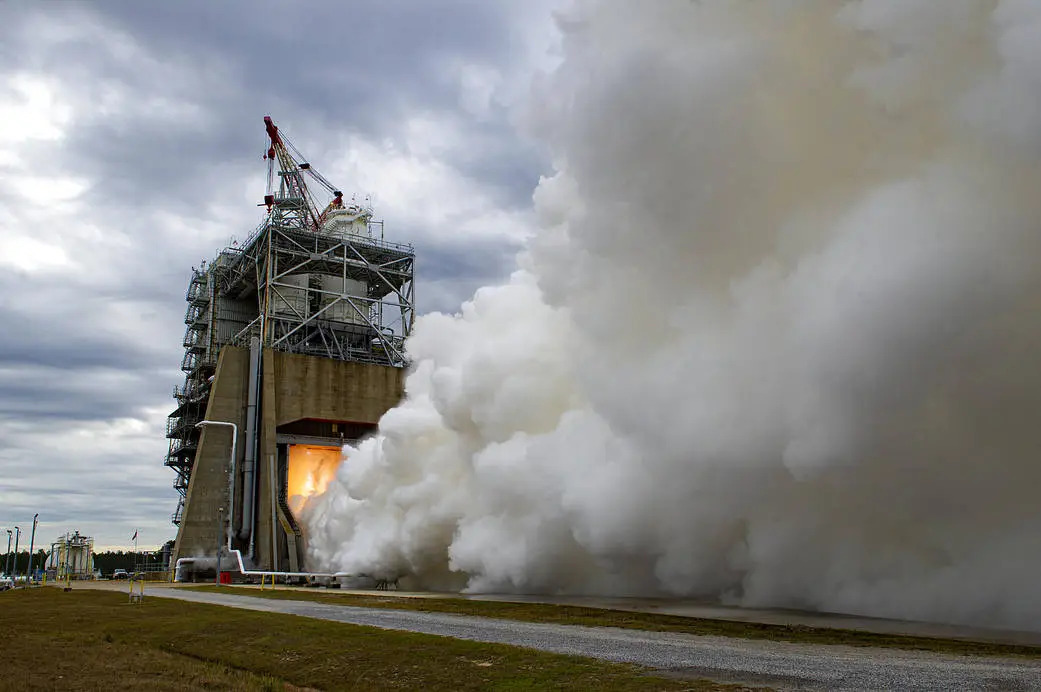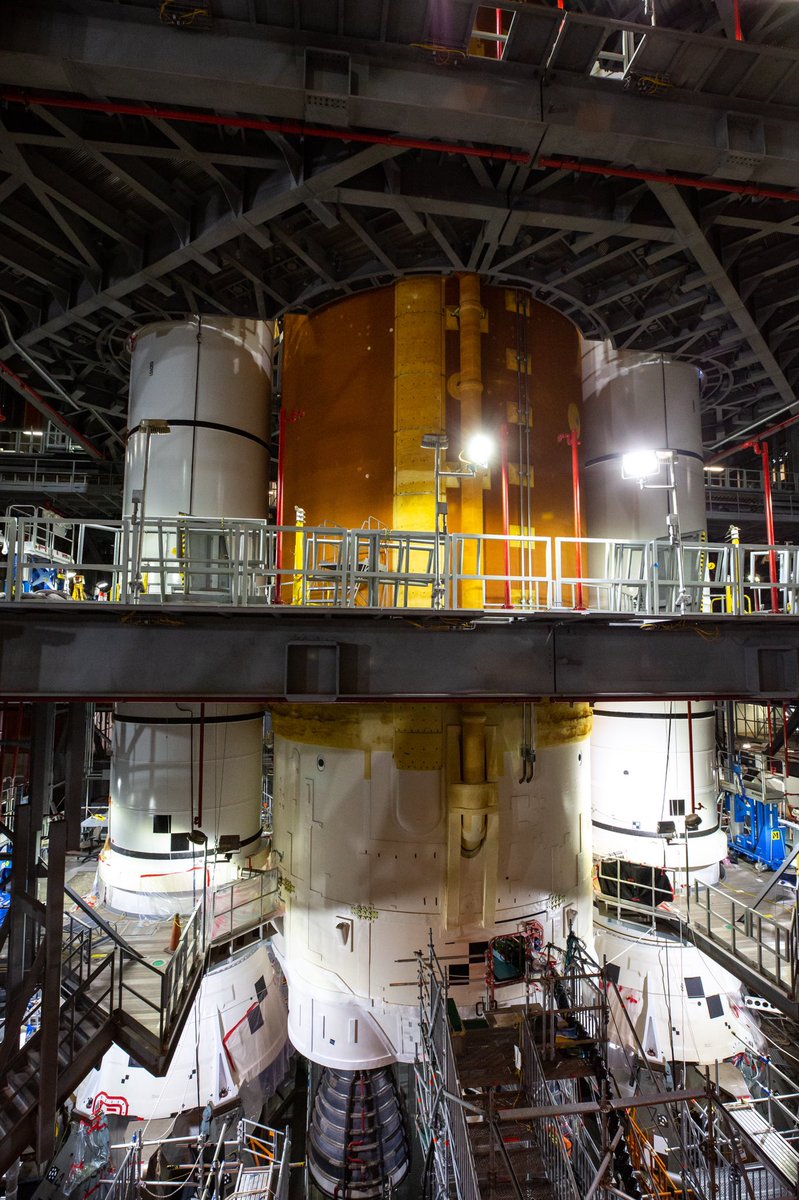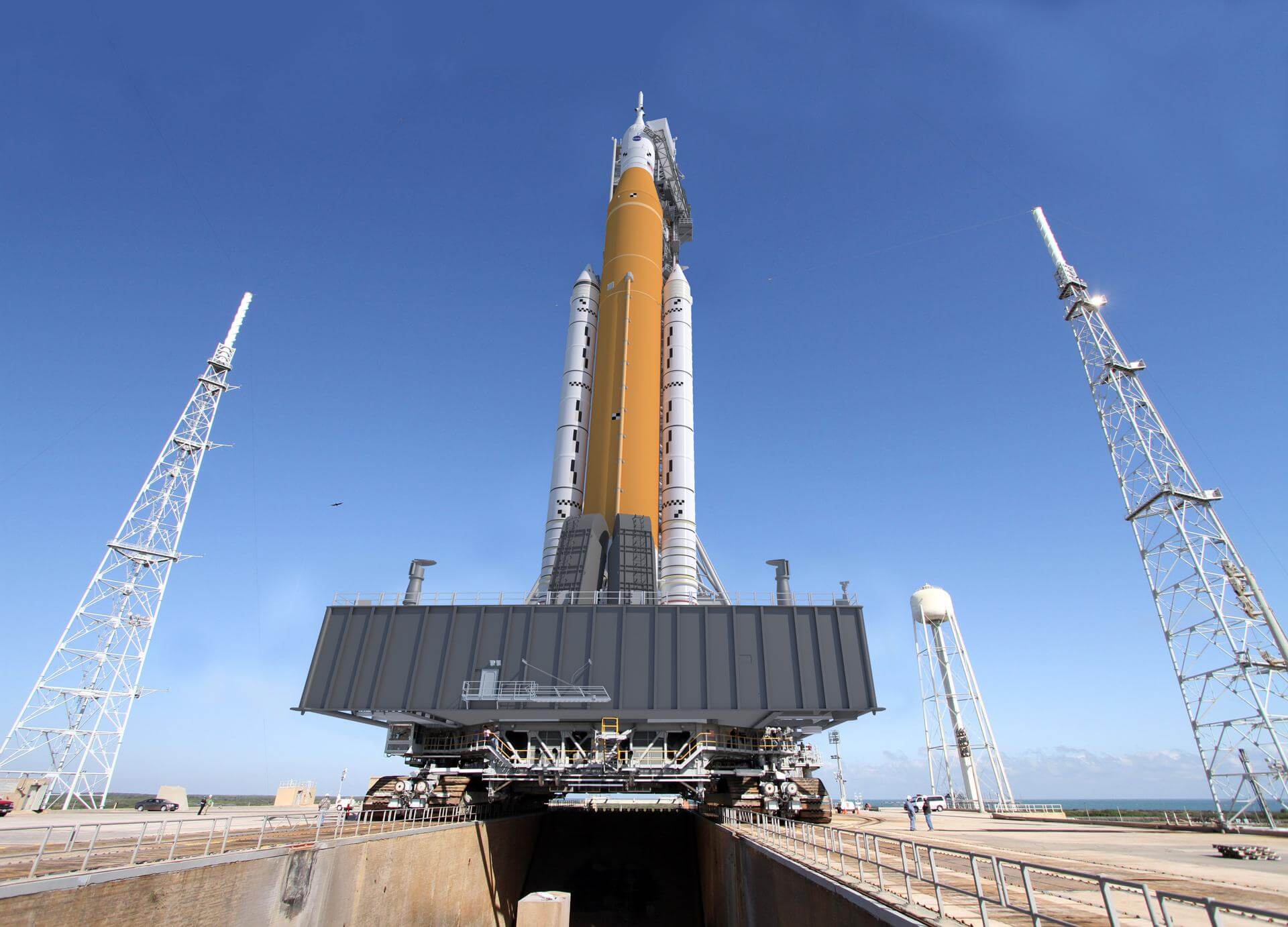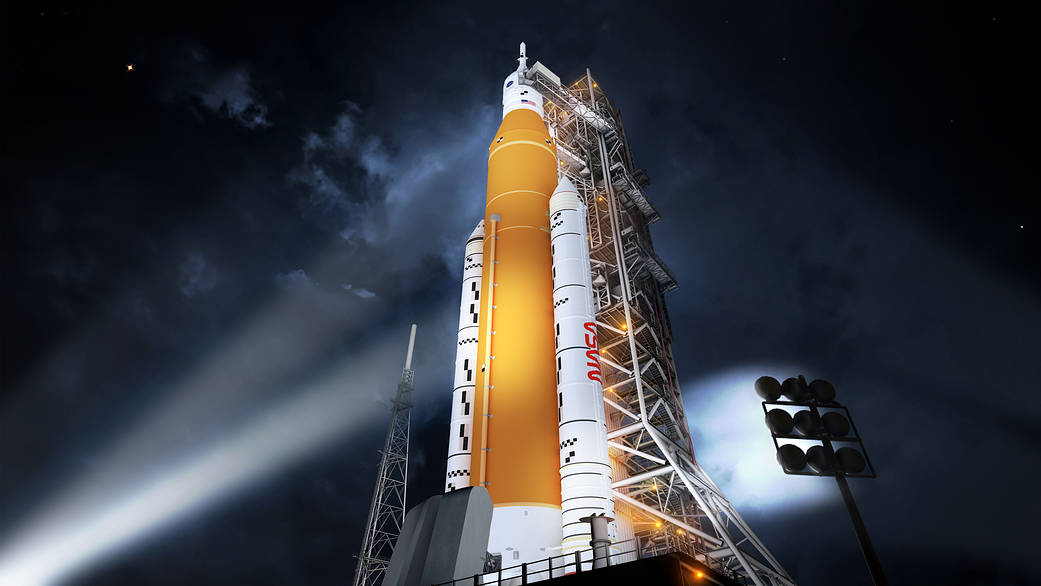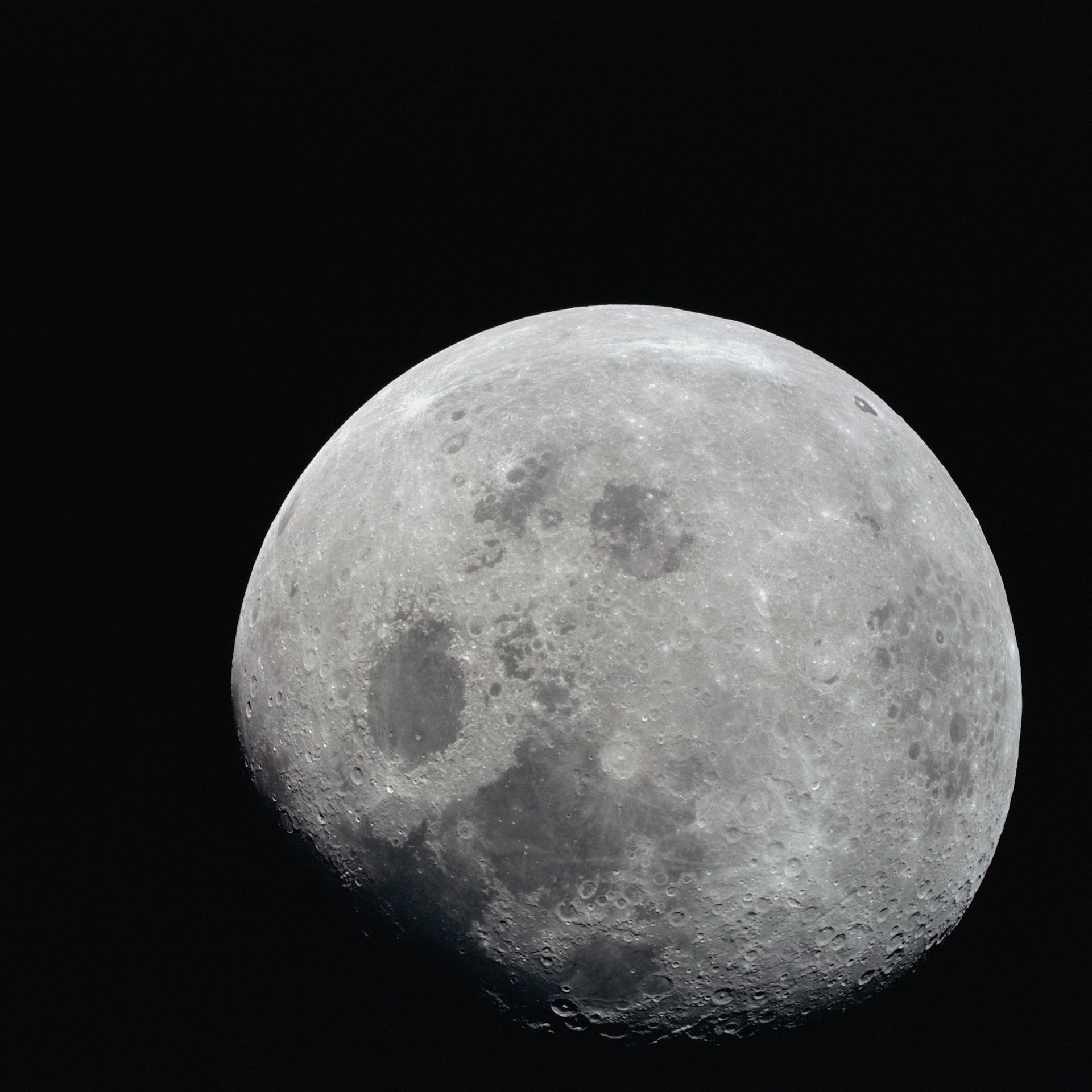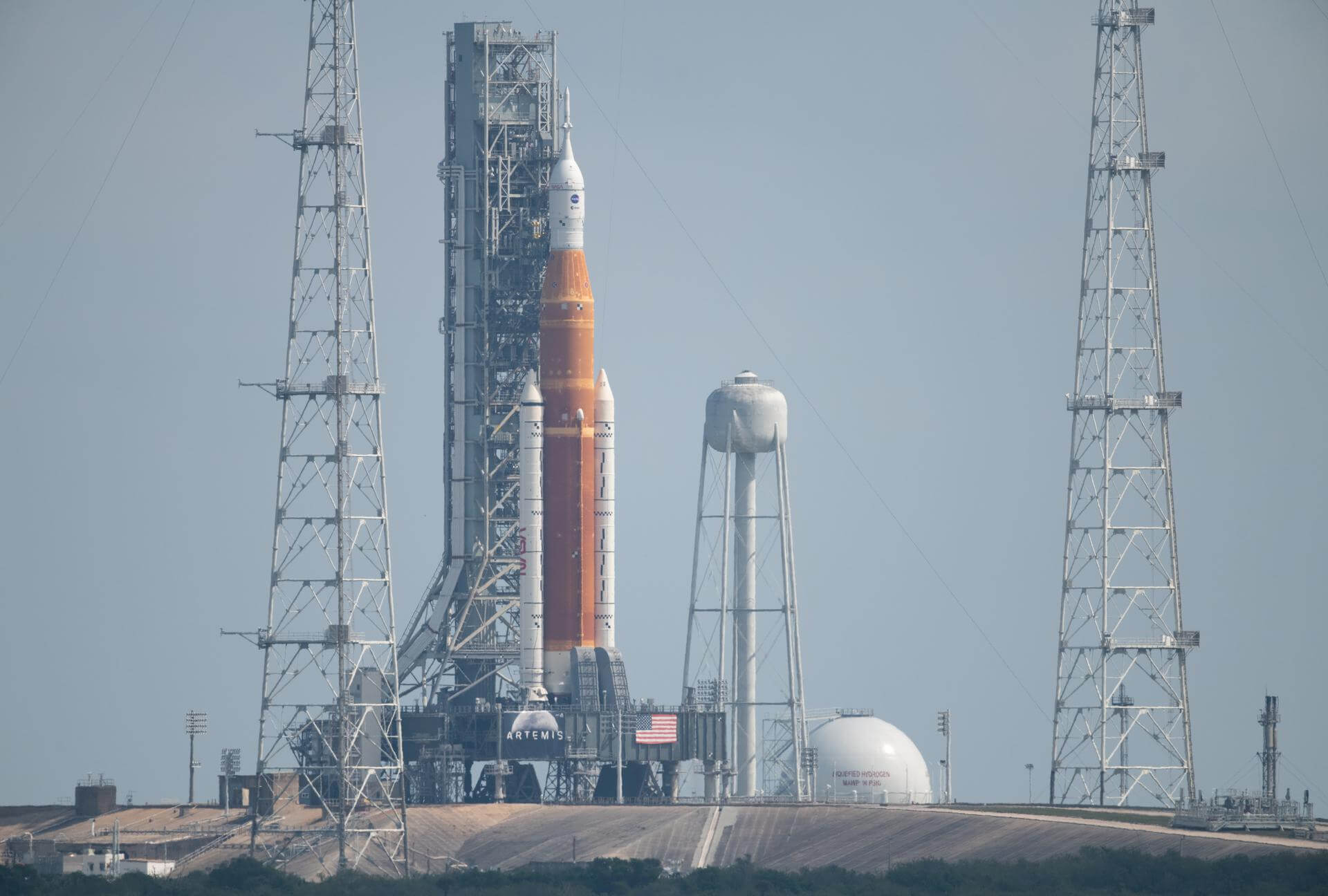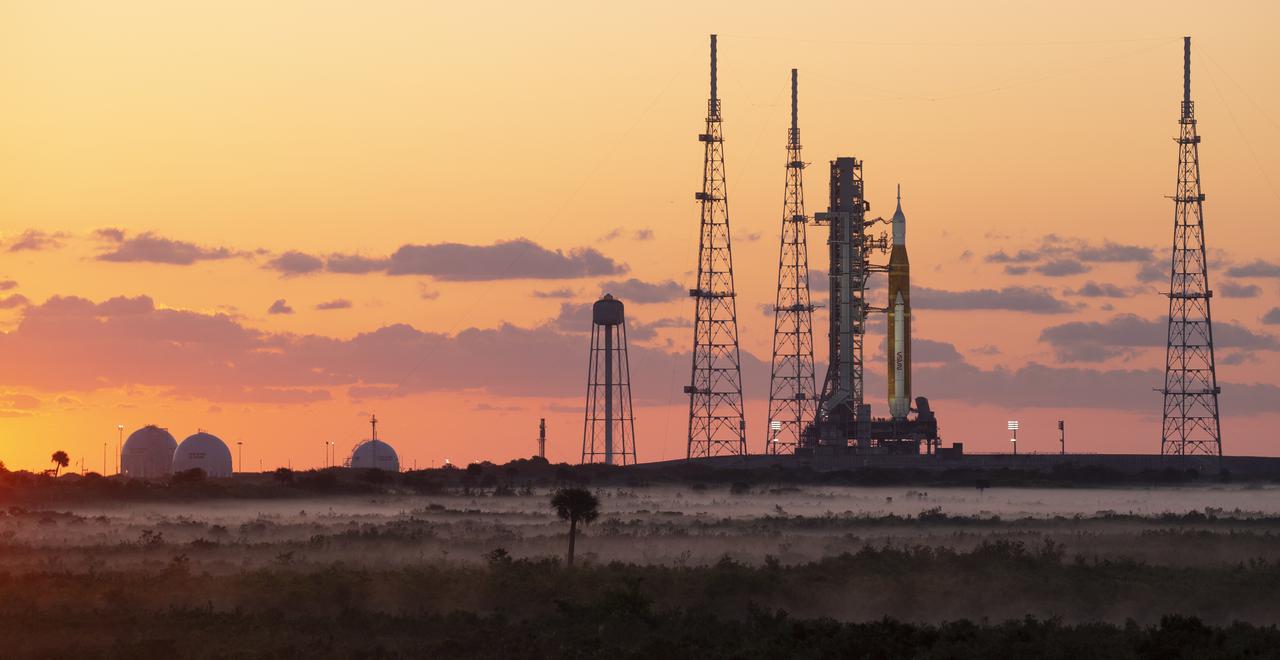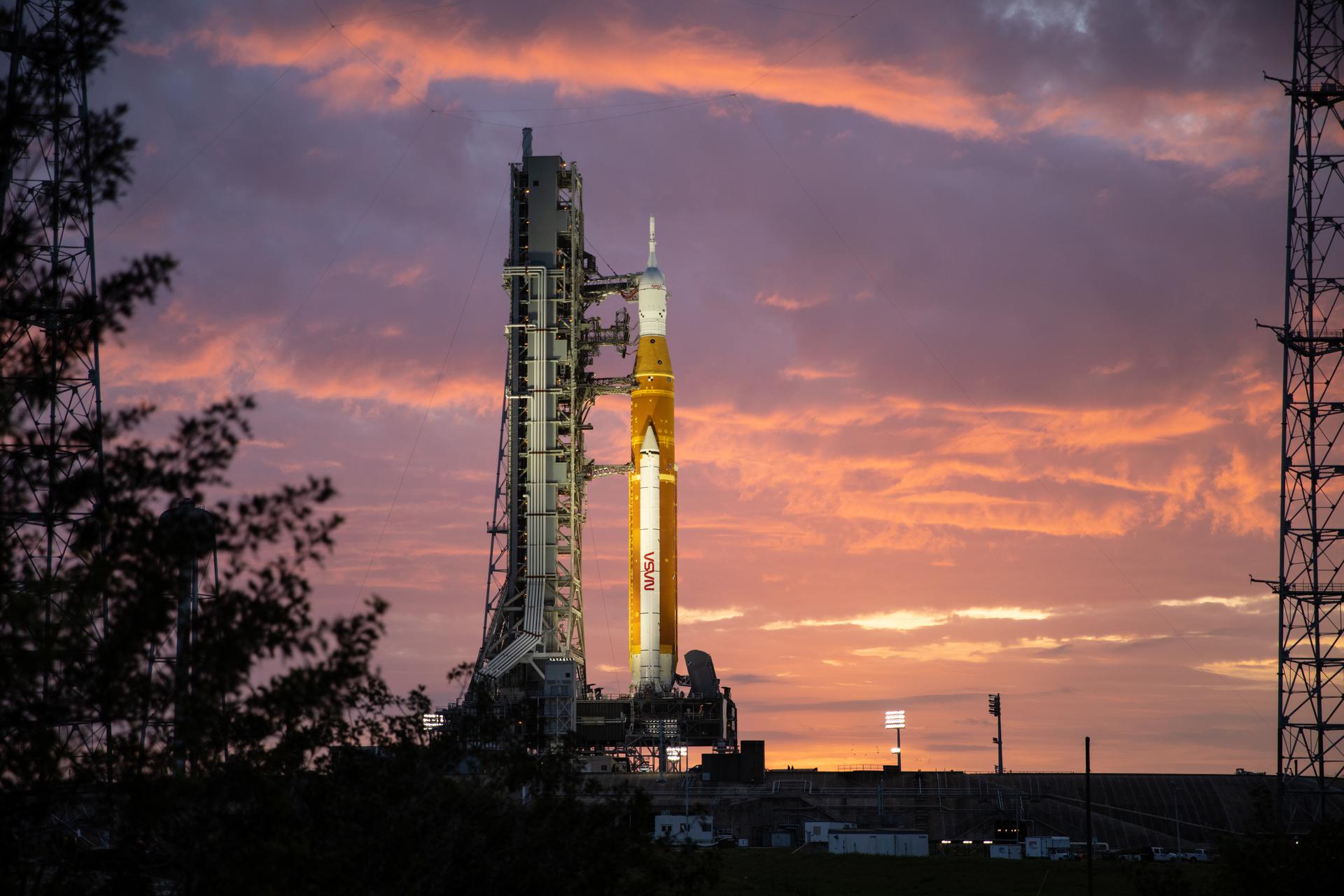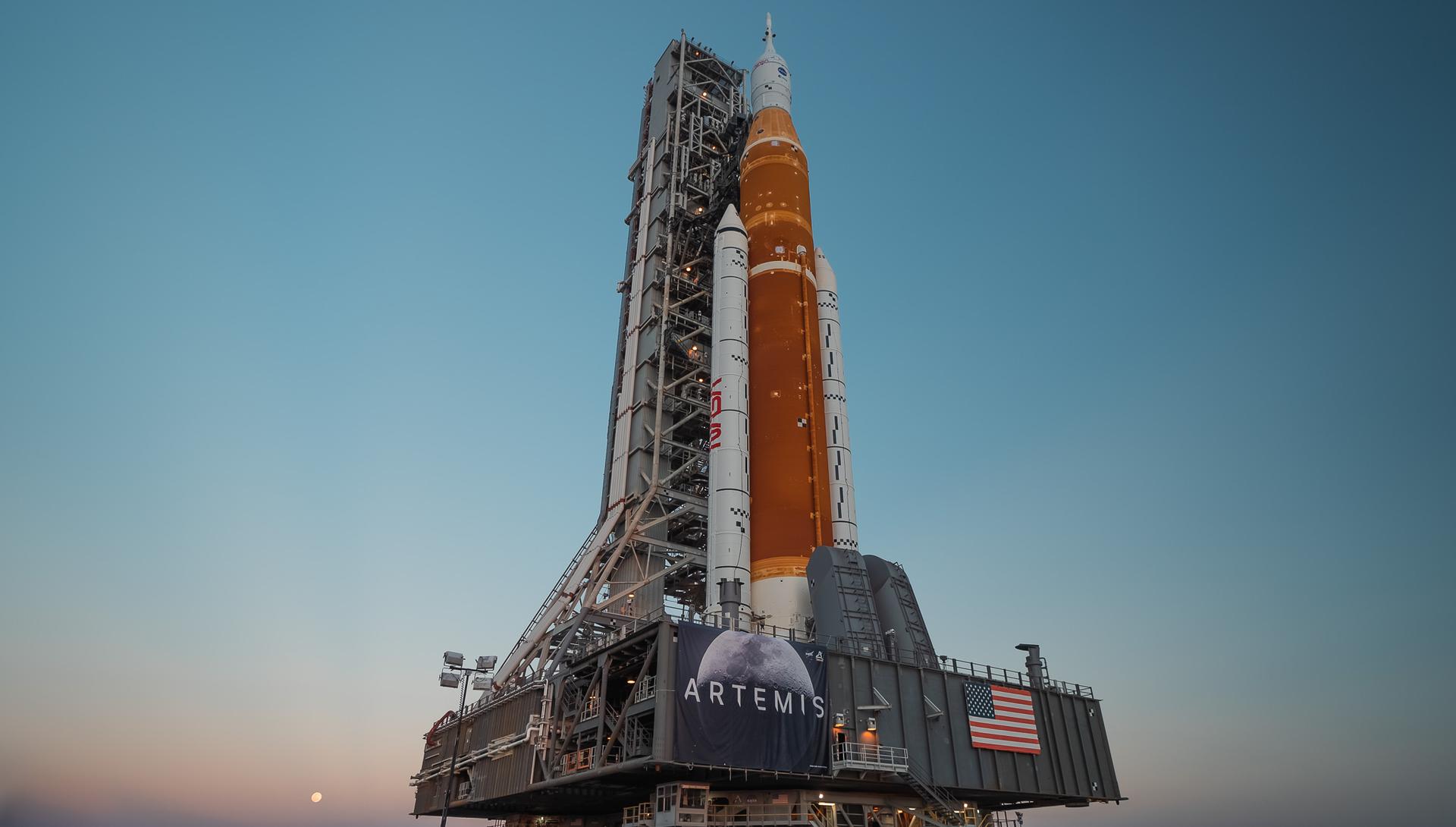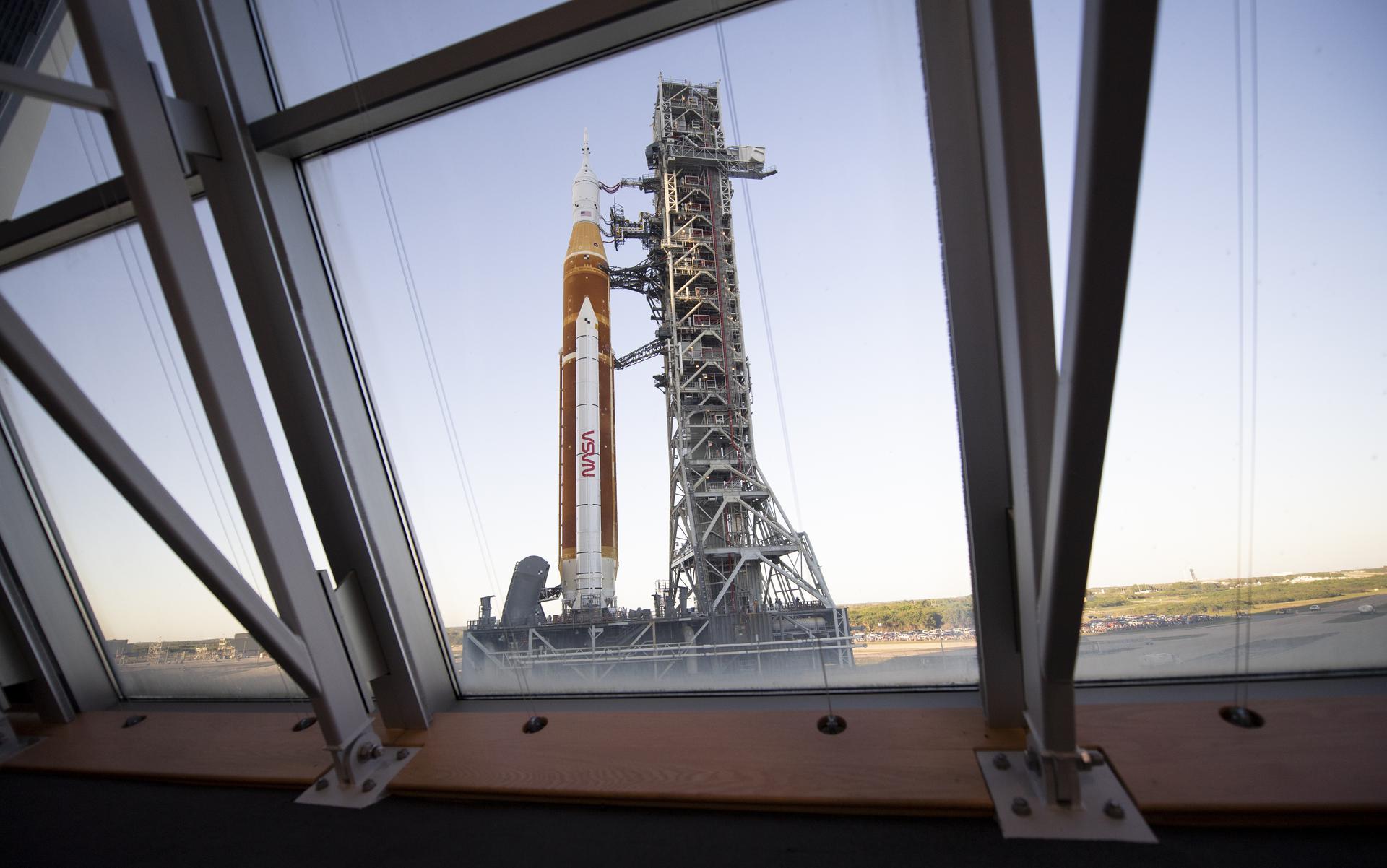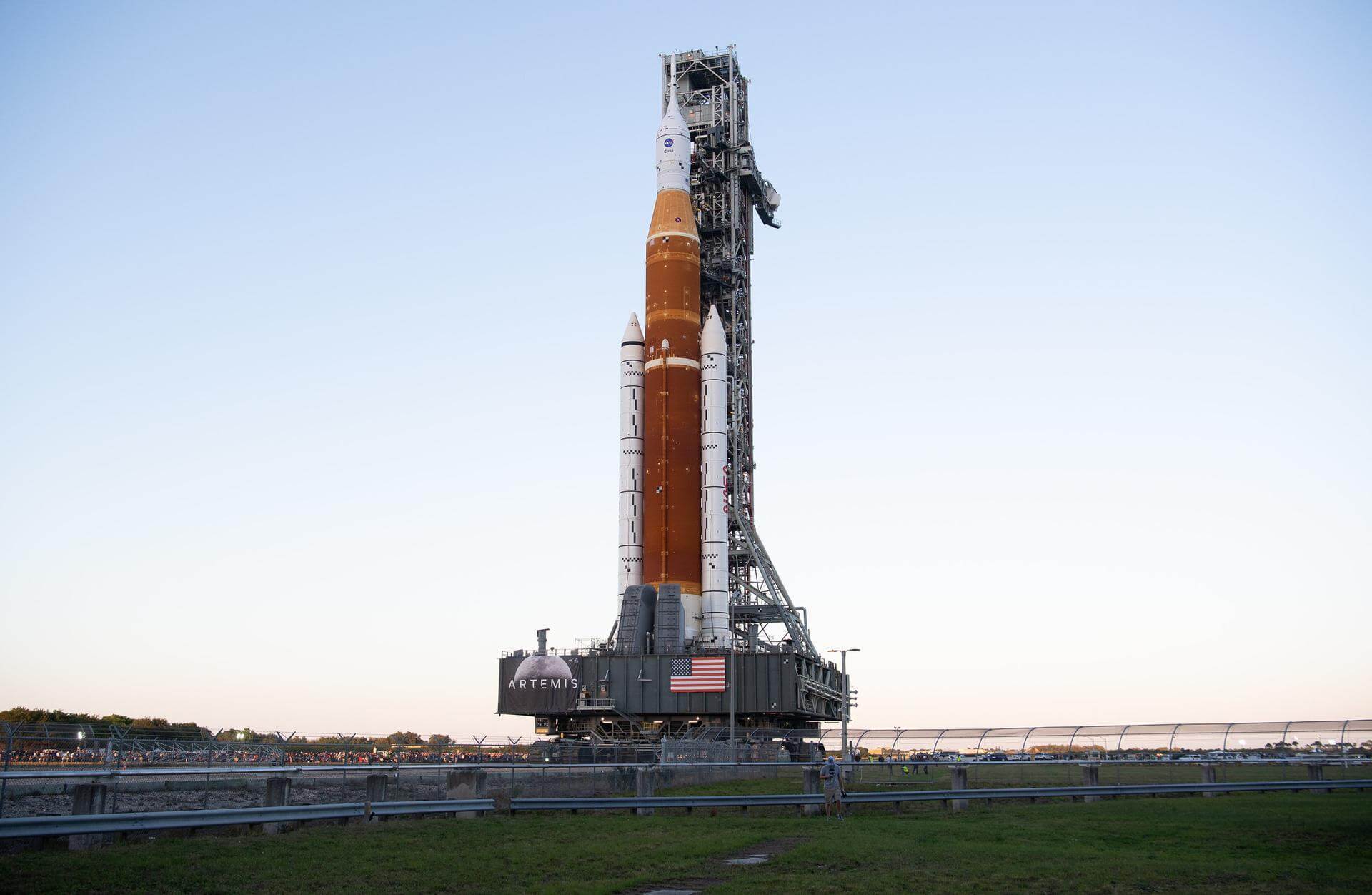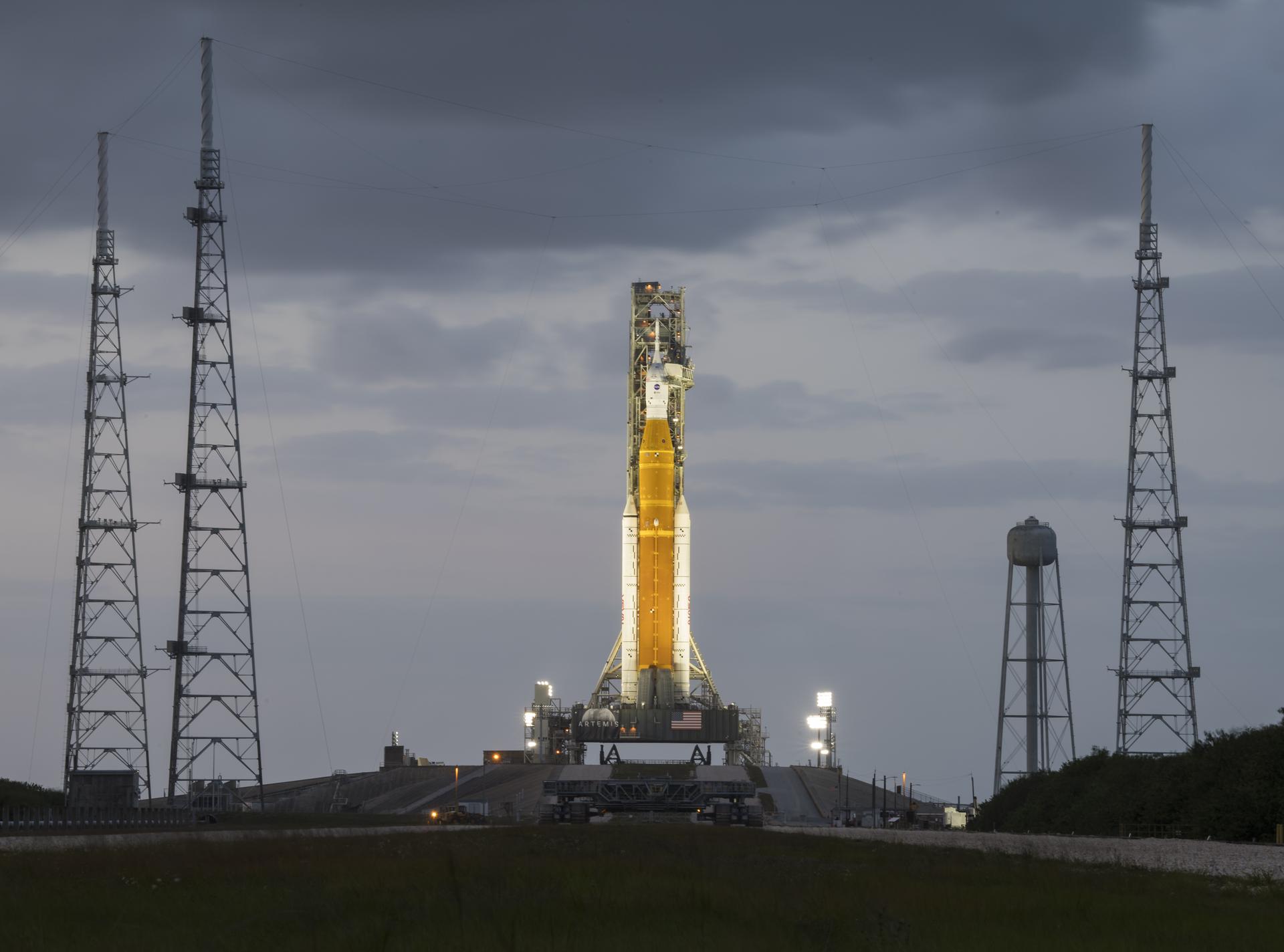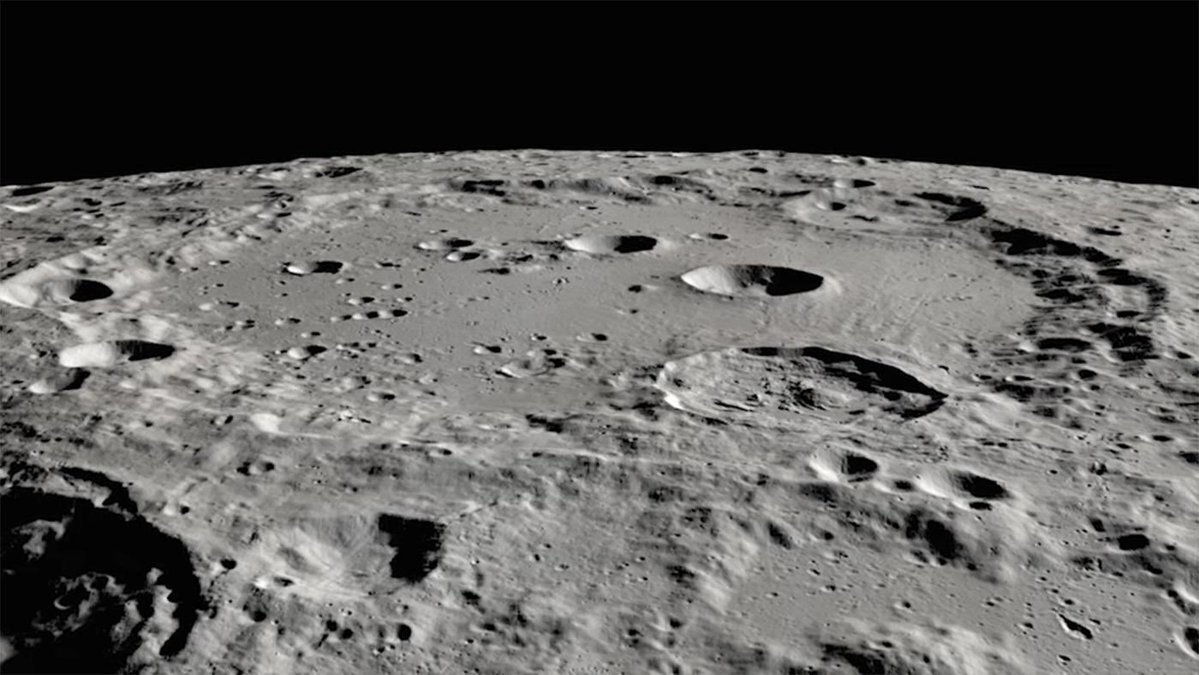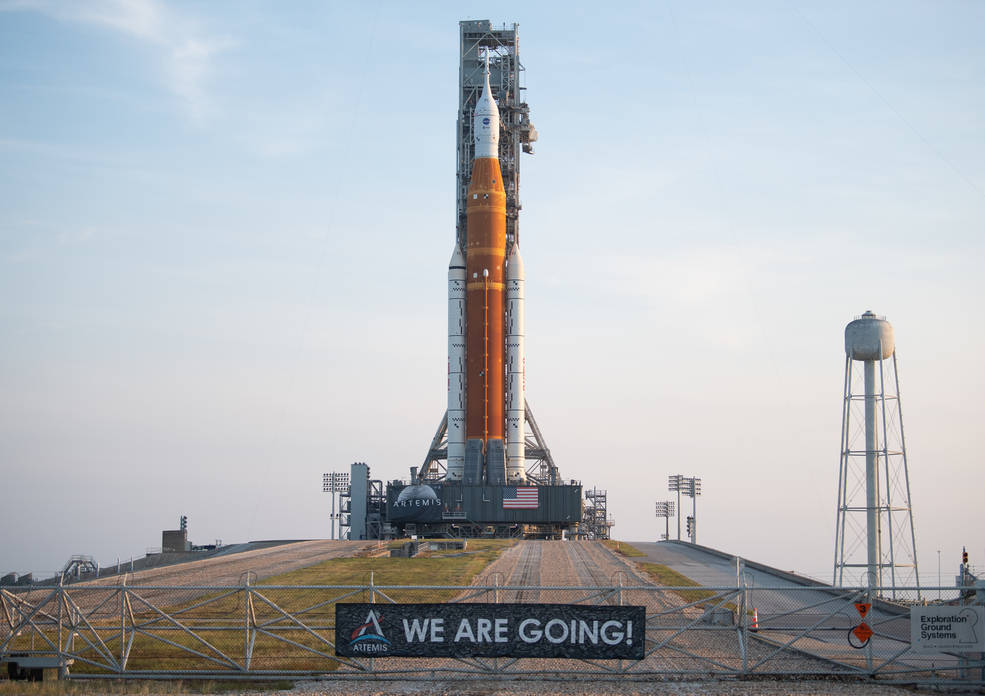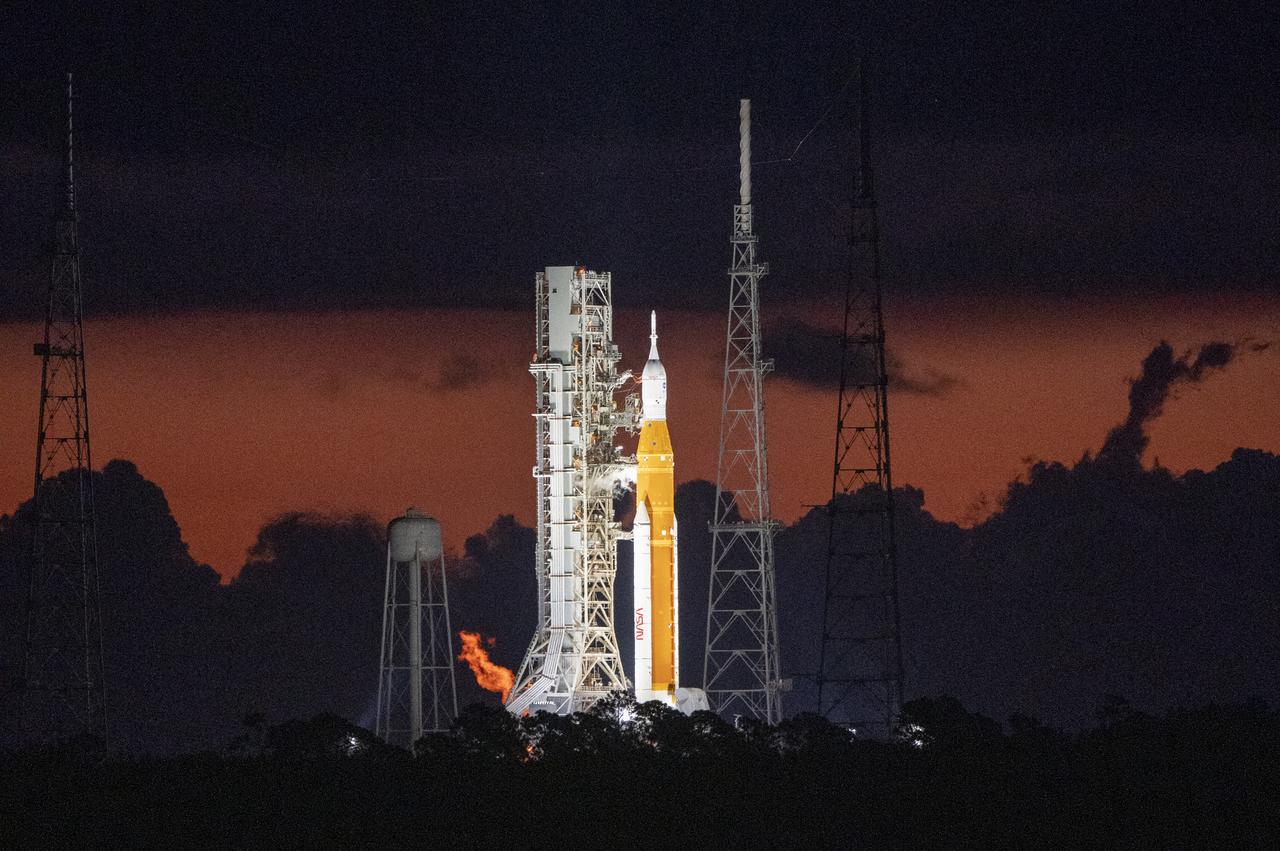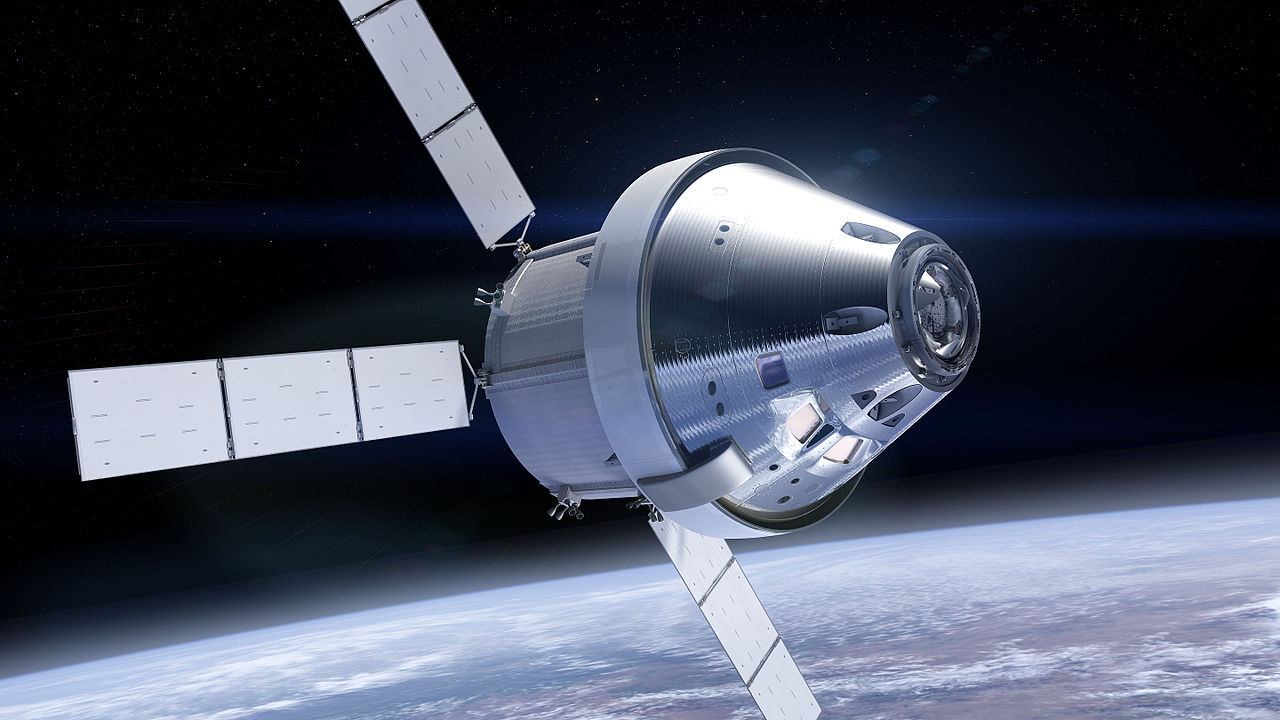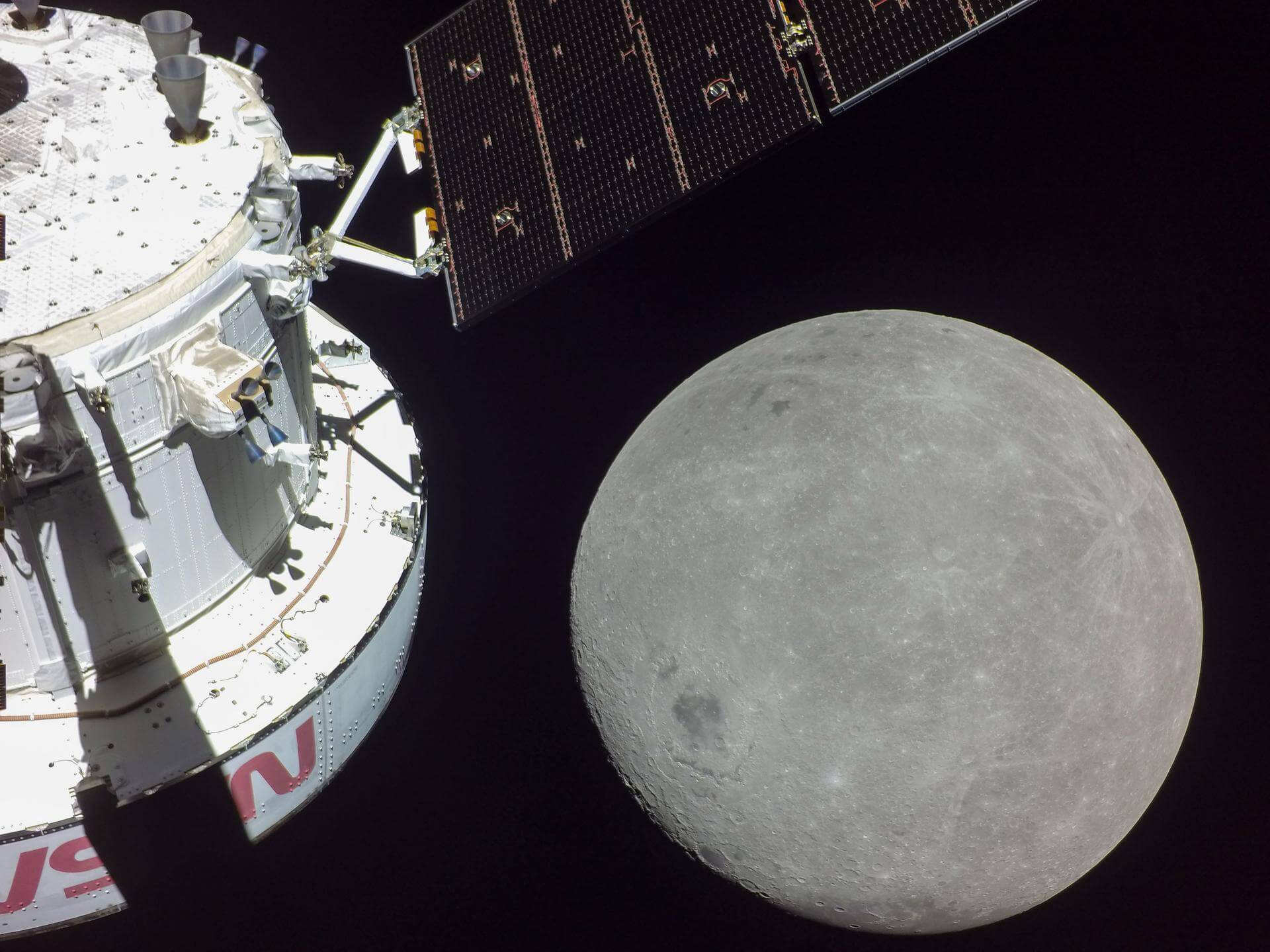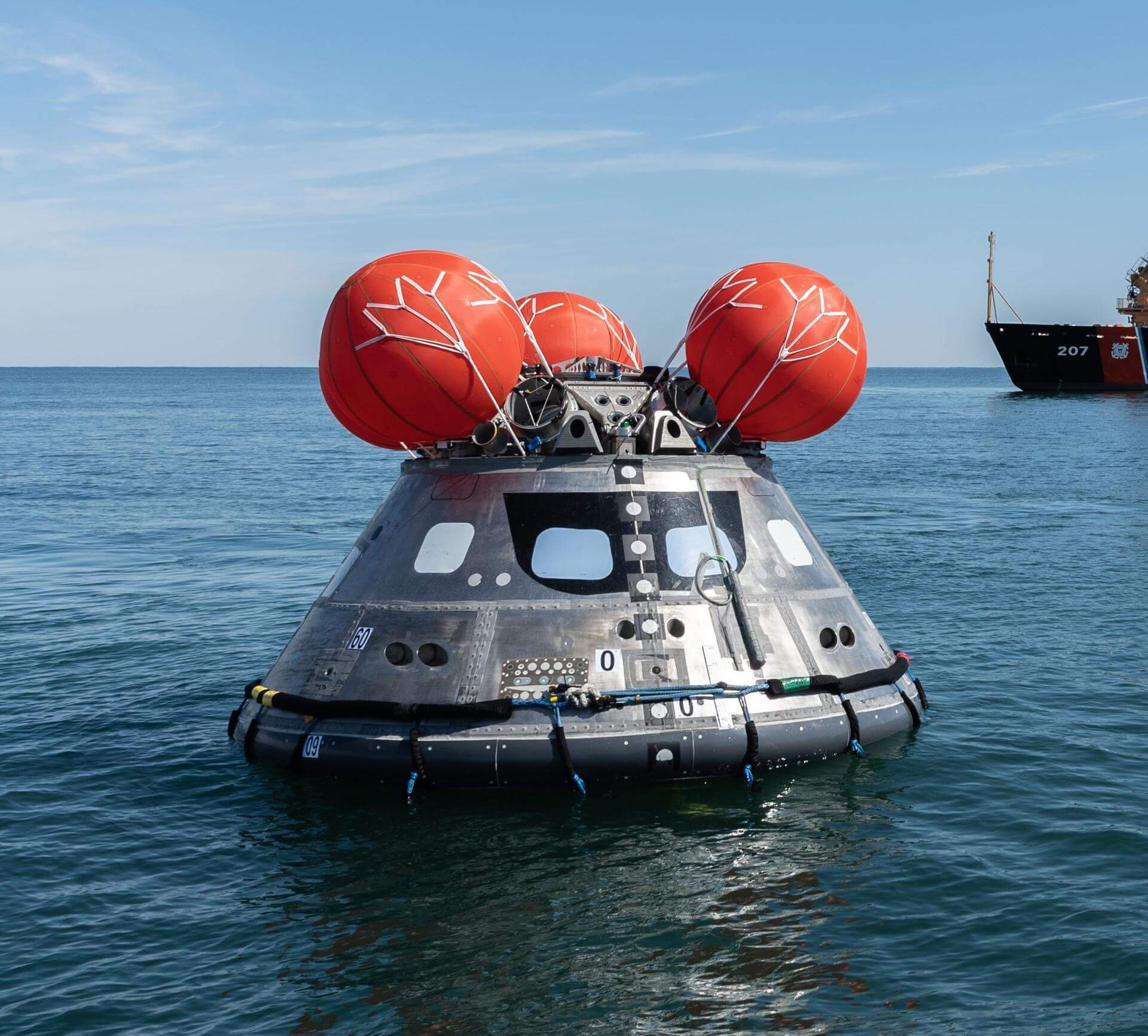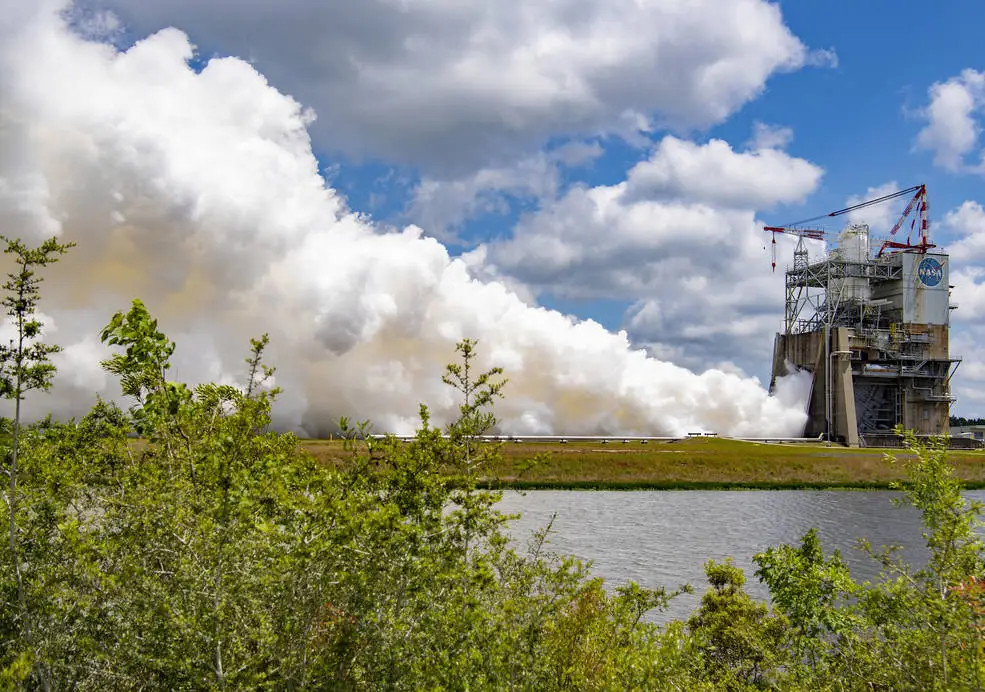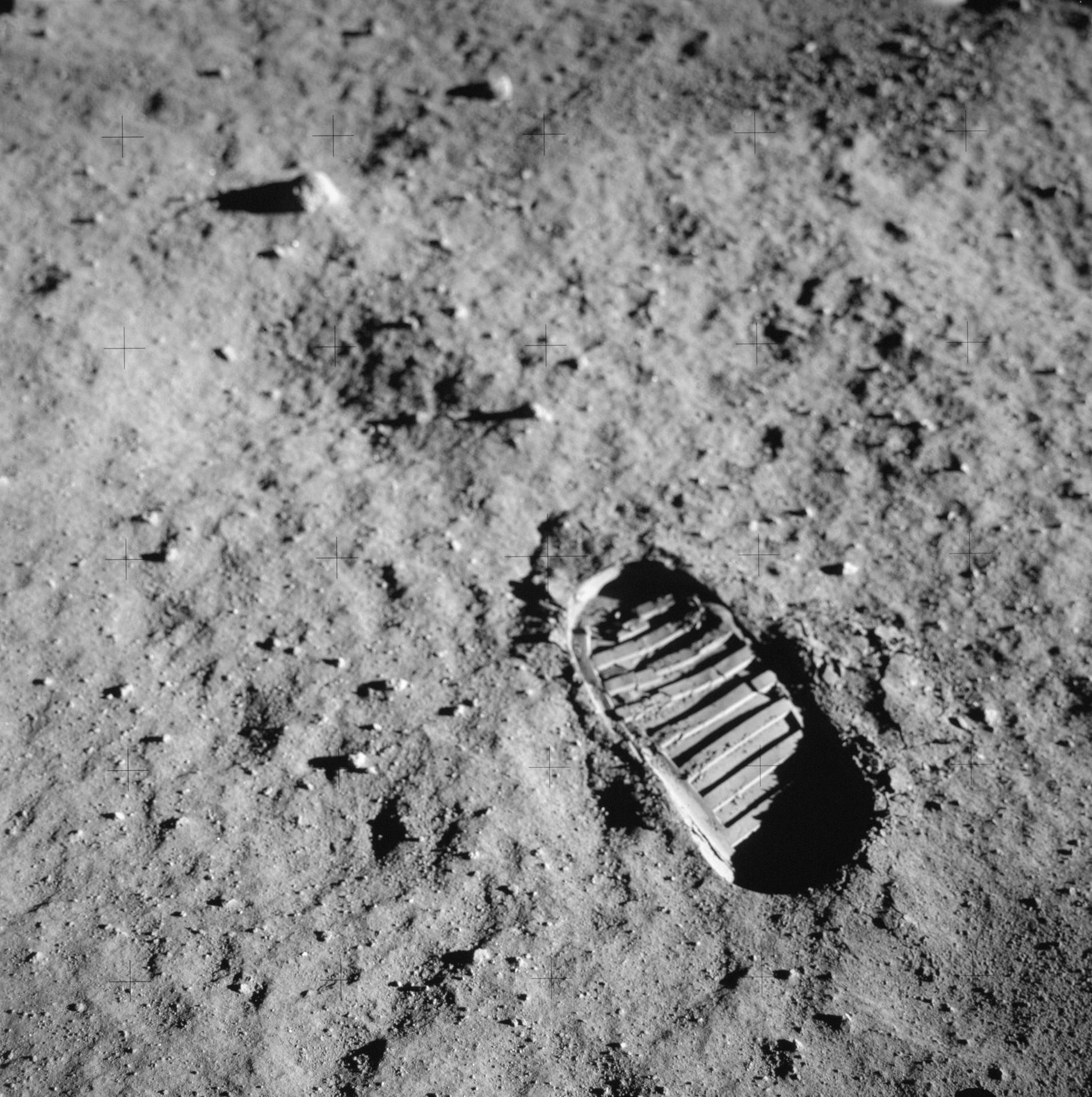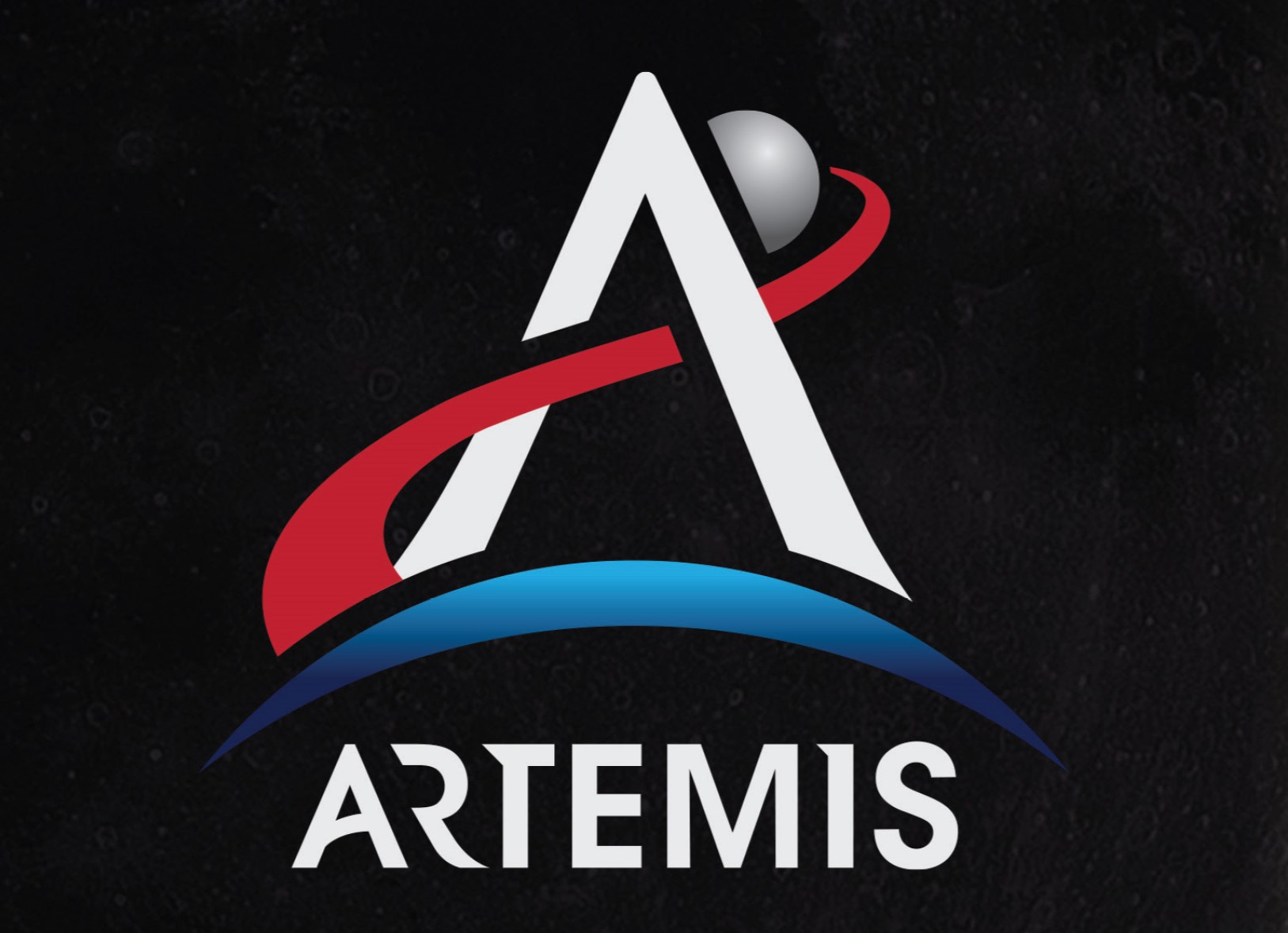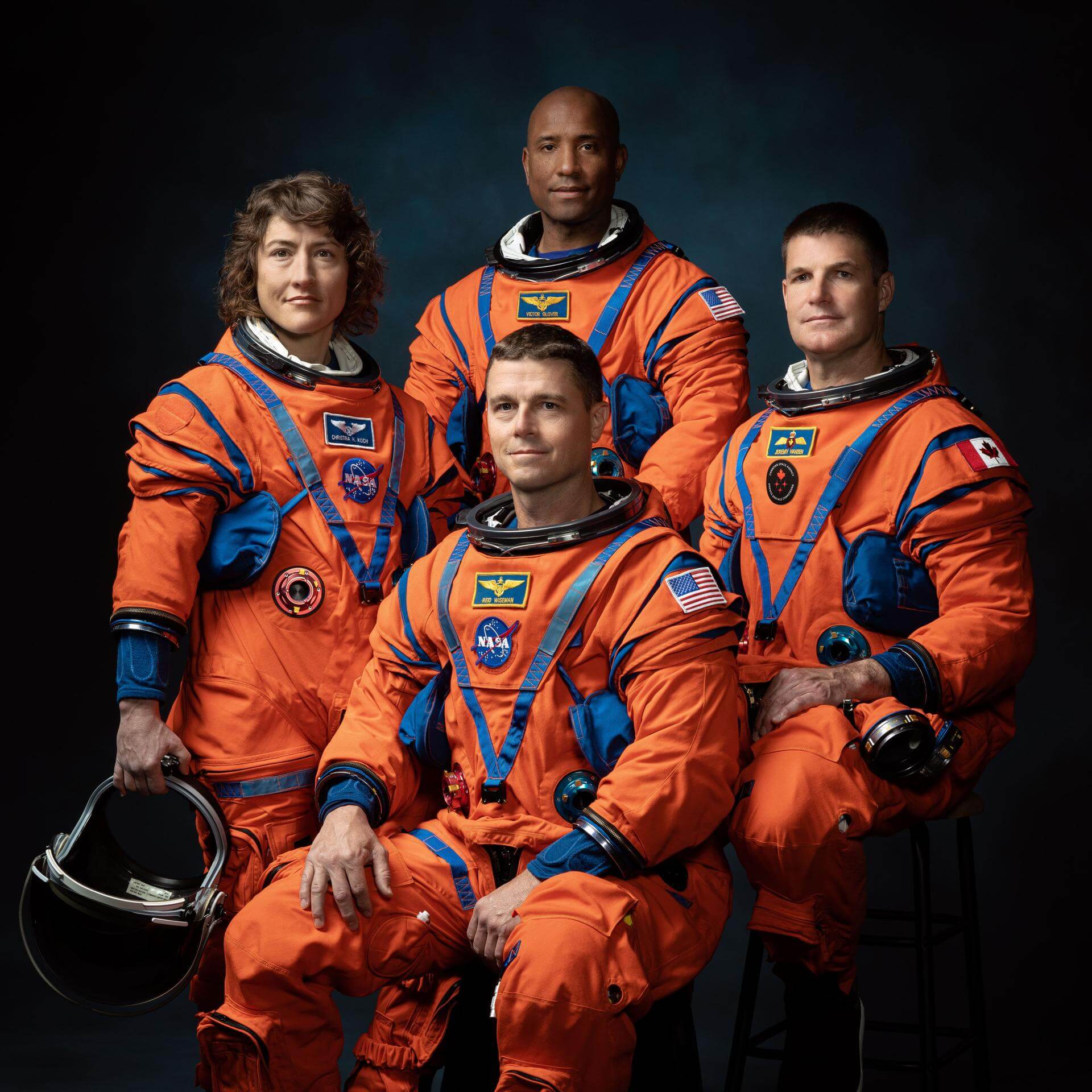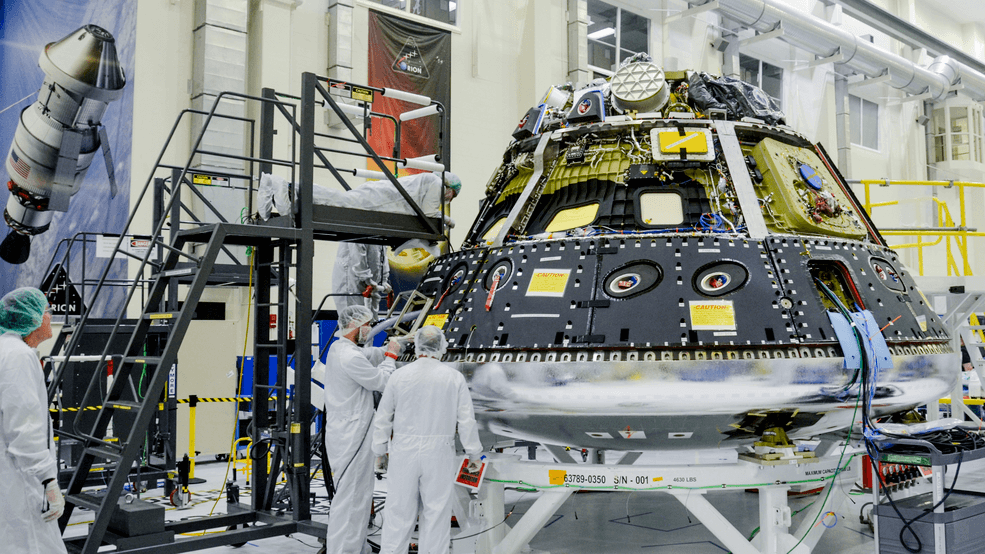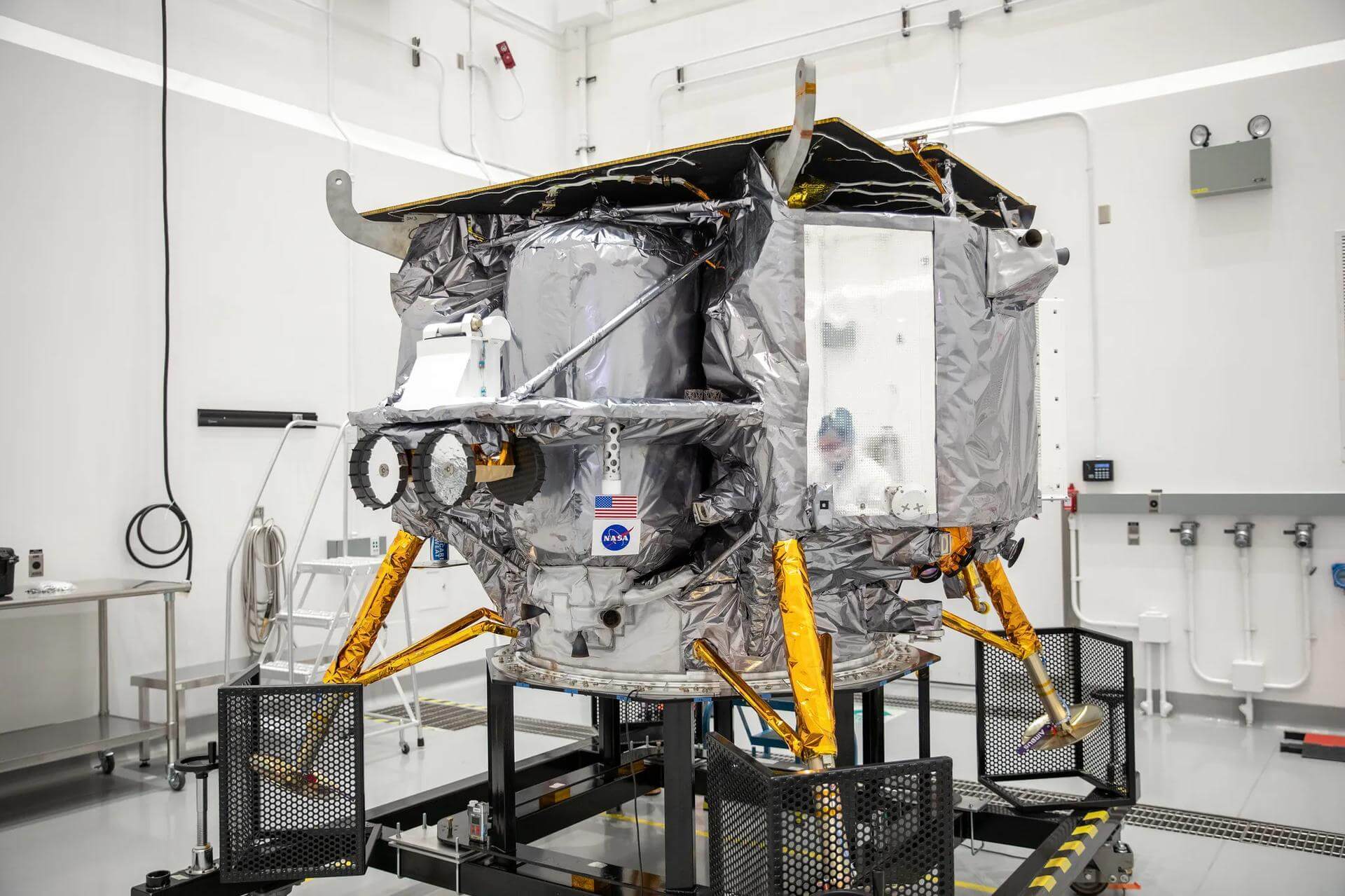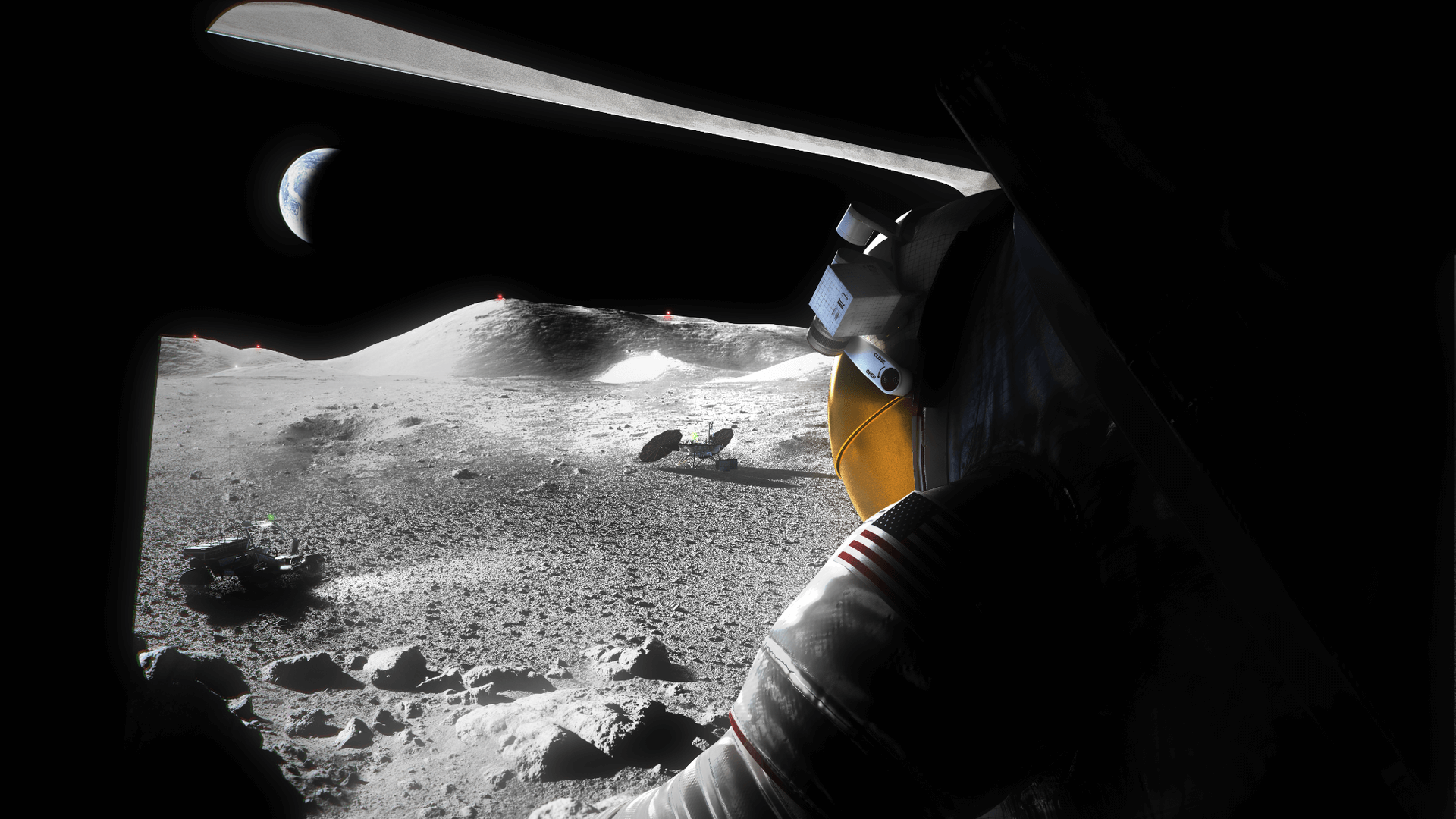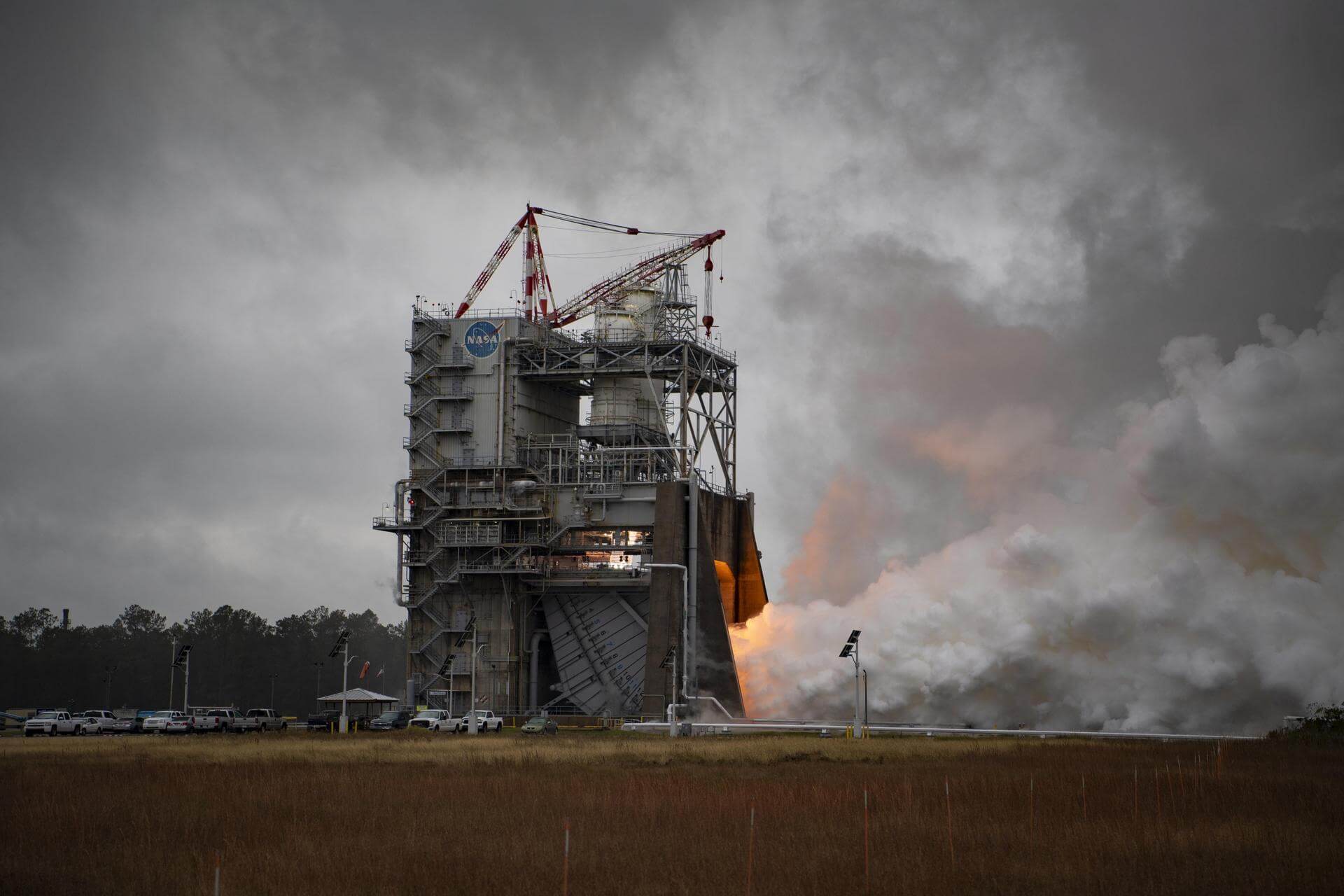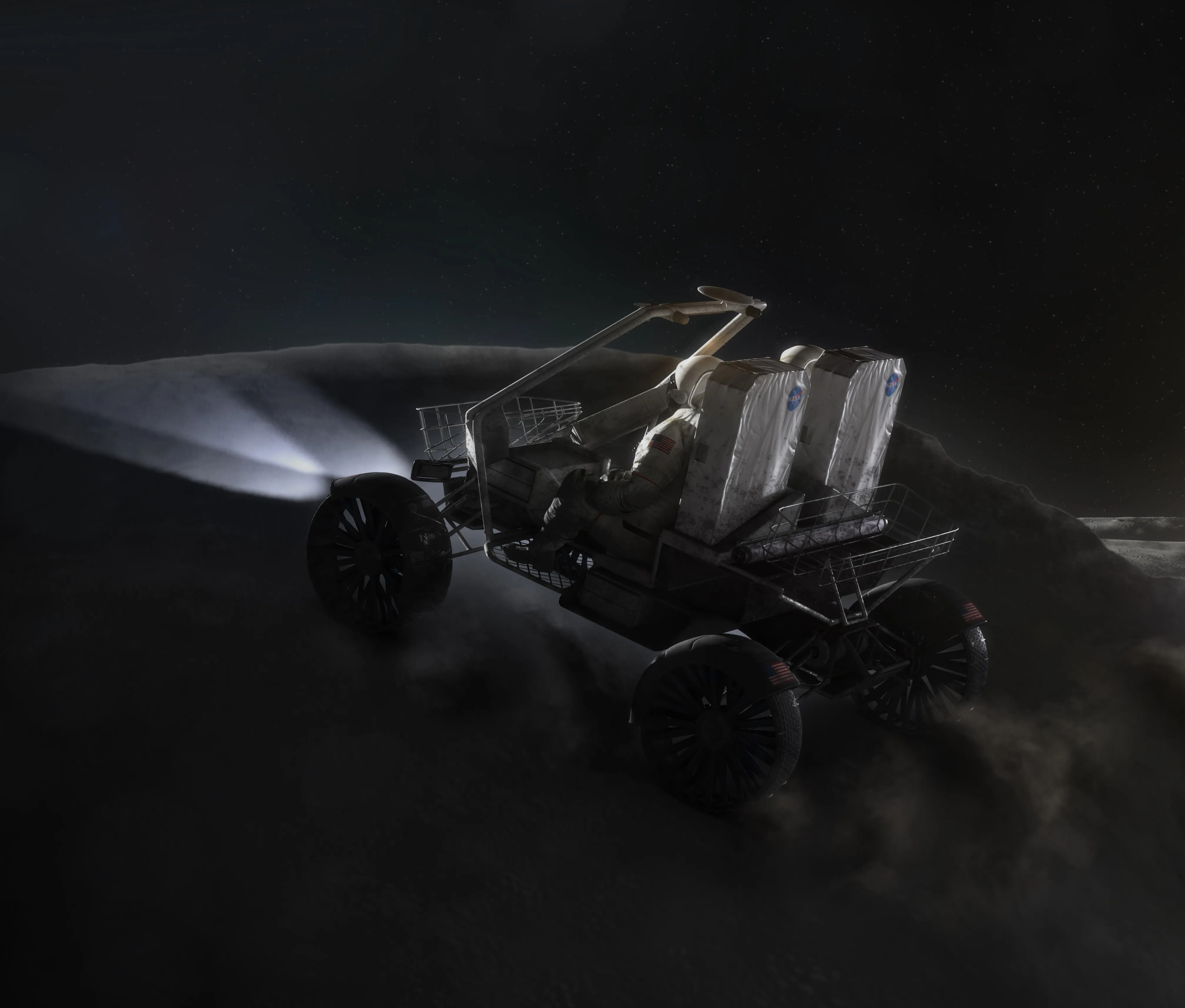Artemis
The Artemis program is a US government-funded crewed spaceflight program that has the goal of landing "the first woman and the next man" on the Moon, specifically at the lunar south pole region by 2024.
Related Agencies
National Aeronautics and Space Administration
The National Aeronautics and Space Administration is an independent agency of the executive branch of the United States federal government responsible for the civilian space program, as well as aeronautics and aerospace research. NASA have many launch facilities but most are inactive. The most commonly used pad will be LC-39B at Kennedy Space Center in Florida.
Related Launches
Delta IV Heavy | EFT-1
United Launch Alliance
Cape Canaveral SFS, FL, USA
Date Loading...
Orion Test Booster | Ascent Abort-2
National Aeronautics and Space Administration
Cape Canaveral SFS, FL, USA
Date Loading...
SLS Block 1 | Artemis I
National Aeronautics and Space Administration
Kennedy Space Center, FL, USA
Date Loading...
SLS Block 1 | Artemis II
National Aeronautics and Space Administration
Kennedy Space Center, FL, USA
T?
--
Days
:
--
Hours
:
--
Mins
:
--
Secs
Date Loading...
SLS Block 1 | Artemis III
National Aeronautics and Space Administration
Kennedy Space Center, FL, USA
T?
--
Days
:
--
Hours
:
--
Mins
:
--
Secs
Date Loading...
Falcon Heavy | Gateway PPE & HALO
SpaceX
Kennedy Space Center, FL, USA
T?
--
Days
:
--
Hours
:
--
Mins
:
--
Secs
Date Loading...
SLS Block 1B | Artemis IV
National Aeronautics and Space Administration
Kennedy Space Center, FL, USA
T?
--
Days
:
--
Hours
:
--
Mins
:
--
Secs
Date Loading...
SLS Block 1B | Artemis V
National Aeronautics and Space Administration
Kennedy Space Center, FL, USA
T?
--
Days
:
--
Hours
:
--
Mins
:
--
Secs
Date Loading...
SLS Block 1B | Artemis VI
National Aeronautics and Space Administration
Kennedy Space Center, FL, USA
T?
--
Days
:
--
Hours
:
--
Mins
:
--
Secs
Date Loading...
SLS Block 1B | Artemis VII
National Aeronautics and Space Administration
Kennedy Space Center, FL, USA
T?
--
Days
:
--
Hours
:
--
Mins
:
--
Secs
Date Loading...
Related Events
SLS Flight Support Booster-1 Static Fire
T?
Flight Support Booster-1 (FSB-1) is a full-scale solid rocket booster ground test that supports flights of NASA's Space Launch System. The objective is to confirm motor performance and manufacturing quality of the booster.
SLS Green Run Wet Dress Rehearsal
T?
Engineers demonstrated loading, controlling and draining more than 700,000 gallons (2.6 million liters) of cryogenic propellants into the liquid oxygen and liquid hydrogen tanks and then returning the stage to a safe condition. Toward the end of the simulated terminal countdown, the test automatically stopped due to a valve closure being off by a fraction of a second. The team has corrected the timing, and additional analysis clears the way for hot fire.
SLS Green Run Hot Fire
T?
The core stage of the Space Launch System will undergo the final 'Green Run' test, where the four RS-25 engines will be fired for 8 minutes, demonstrating performance similar to an actual launch.
SLS Hot Fire Post-Test Conference
T?
NASA will host a press conference on the results of the SLS Green Run Hot Fire. The test was aborted approximately 1 minute into an 8 minute hot fire.
SLS 2nd Hot Fire Test
T?
NASA successfully conducted a second Green Run hot fire with the Space Launch System (SLS) rocket’s core stage that will launch the Artemis I mission to the Moon. The four RS-25 engines were fired for 8 minutes, demonstrating performance similar to an actual launch.
RS-25 Engine Test
T?
NASA will conduct an RS-25 engine test on the A-1 Test Stand at Stennis Space Center near Bay St. Louis, Mississippi.
RS-25 Engine Test
T?
"RS-25 engine testing for future #Artemis missions continues TODAY! Tune in to a Facebook Live event tentatively scheduled between 1:30-3:30 p.m. CDT!" - NASA
RS-25 Engine Test
T?
NASA will conduct an RS-25 engine test on the A-1 Test Stand 19:20 UTC at the Stennis Space Center near Bay St. Louis, Mississippi.
NASA Artemis I Update
T?
NASA is holding a teleconference to update media on the Artemis-1 mission.
RS-25 Engine Test
T?
NASA will conduct an RS-25 engine test on the A-1 Test Stand between 20:00 and 21:00 UTC at the Stennis Space Center near Bay St. Louis, Mississippi.
RS-25 Engine Test
T?
NASA will conduct an RS-25 engine test on the A-1 Test Stand between 19:30 and 21:30 UTC at the Stennis Space Center near Bay St. Louis, Mississippi.
RS-25 Engine Test
T?
NASA will conduct an RS-25 engine test on the A-1 Test Stand around 20:57 UTC at the Stennis Space Center near Bay St. Louis, Mississippi.
RS-25 Engine Test
T?
NASA will conduct an RS-25 engine test on the A-1 Test Stand between 19:30 and 21:30 UTC at the Stennis Space Center near Bay St. Louis, Mississippi.
Artemis I Status Update
T?
NASA will host a media teleconference to provide an update on progress toward the launch of the agency’s uncrewed Artemis-1 mission.
Artemis I Rollout and Wet Dress Rehearsal Media Briefing
T?
NASA will hold a media teleconference to provide an update on the rollout of the Space Launch System rocket, currently scheduled for March 17th, as well as the wet-dress rehearsal the vehicle will undergo.
Artemis I SLS Rollout #1
T?
NASA will roll out their first fully stacked Space Launch System (SLS) rocket to LC-39B, where it will complete a wet dress rehearsal (WDR) which involves loading the vehicle with propellants and taking the vehicle through the countdown to ignition where the countdown is halted. After the WDR, NASA will roll the vehicle back to the Vehicle Assembly Building to complete final checks prior to rolling out for launch later this year. The rollout is expected to take around 11 hours, and will utilise an upgraded crawler transporter - the same system its predecessors (Space Shuttle, Ares, Saturn, etc.) used.
NASA Astronaut Moon Landers Strategy Media Teleconference
T?
NASA will host a media teleconference at 3:30 p.m. EDT Wednesday, March 23, to provide an update on the agency’s goals to transport astronauts from lunar orbit to the surface of the Moon under Artemis.
RS-25 Engine Test
T?
NASA will conduct an RS-25 engine test on the A-1 Test Stand at around 18:57 UTC at the Stennis Space Center near Bay St. Louis, Mississippi.
Artemis I WDR Abort Update
T?
NASA will provide an update on the wet dress rehearsal which began Friday, April 1, and was halted Sunday at T-6 hours due to an issue with a fan required to maintain pressure to the enclosed areas of the mobile launcher.
Artemis I WDR Abort Update #2
T?
NASA will hold a media teleconference regarding the Artemis-1 wet dress rehearsal at 8 p.m. UTC. The purpose of the briefing is to provide insight into the scrub on April 5th due to an anomaly with a panel on the mobile launcher which controls the core stage vent valve during tanking.
Artemis I WDR Update
T?
NASA will provide an update on the Artemis-1 SLS wet dress rehearsal.
Artemis I WDR Update
T?
NASA will provide an update on the Artemis-1 SLS wet dress rehearsal.
Artemis I SLS Rollback #1
T?
NASA will roll the Artemis-1 SLS rocket back to the Vehicle Assembly Building to complete checkouts and conduct repairs.
Artemis I WDR #2 Media Teleconference
T?
NASA will hold a media teleconference at to discuss the status of the next wet dress rehearsal test of the agency’s Space Launch System (SLS) rocket and Orion spacecraft at the agency’s Kennedy Space Center in Florida.
Artemis I WDR #2 Media Teleconference #2
T?
NASA will hold a media teleconference to discuss the status of the next wet dress rehearsal test of the agency’s Space Launch System (SLS) rocket and Orion spacecraft at the agency’s Kennedy Space Center in Florida ahead of the uncrewed Artemis I lunar mission.
Artemis I SLS Rollout #2
T?
NASA will roll out their Space Launch System (SLS) rocket back to LC-39B, where it will perform a wet dress rehearsal (WDR) which involves loading the vehicle with propellants and taking the vehicle through the countdown to ignition where the countdown is halted. The rollout is expected to take around 11 hours, and will utilize an upgraded crawler transporter - the same system its predecessors (Space Shuttle, Ares, Saturn, etc.) used.
Artemis I Pre-WDR #2 Media Teleconference
T?
NASA will hold a media teleconference ahead of the next wet dress rehearsal test of the agency’s Space Launch System (SLS) rocket and Orion spacecraft at the agency’s Kennedy Space Center in Florida ahead of the uncrewed Artemis I lunar mission.
Artemis I SLS Wet Dress Rehearsal
T?
NASA will perform a wet dress rehearsal of the SLS launch vehicle ahead of the Artemis-1 mission.
Artemis I Post-WDR #2 Media Teleconference
T?
NASA will hold a media teleconference after the second wet dress rehearsal test of the agency’s Space Launch System (SLS) rocket and Orion spacecraft at the agency’s Kennedy Space Center in Florida ahead of the uncrewed Artemis I lunar mission.
Artemis I Status Update #2
T?
NASA will hold a media teleconference to discuss next steps for the Artemis I mission with the Space Launch System (SLS) rocket and Orion spacecraft at the agency’s Kennedy Space Center in Florida.
Artemis I SLS Rollback #2
T?
NASA will roll the Artemis I SLS rocket back to the Vehicle Assembly Building to prepare it for launch.
Artemis I Status Update #3
T?
NASA will hold a media teleconference to discuss next steps for the Artemis I mission with the Space Launch System (SLS) rocket and Orion spacecraft at the agency’s Kennedy Space Center in Florida.
SLS Flight Support Booster-2 Static Fire
T?
Flight Support Booster-2 (FSB-2) is a full-scale static test of a Space Launch System (SLS) solid rocket booster motor. The FSB-2 test builds off the Flight Support Booster-1 test conducted in September 2020 and will demonstrate a newly qualified motor initiation system and qualify a new ablative lining to protect the booster nozzle.
Artemis I Mission Overview Briefing
T?
NASA will host a mission overview briefing about Artemis I which will send the Orion spacecraft around the Moon and back to Earth. The mission will take place over the course of about six weeks to check out systems before crew fly aboard on Artemis II.
Artemis I Detailed Mission Briefing
T?
NASA will host a detailed mission briefing about Artemis I which will send the Orion spacecraft around the Moon and back to Earth. The mission will take place over the course of about six weeks to check out systems before crew fly aboard on Artemis II.
Artemis I Lunar Science Payloads Teleconference
T?
NASA will hold a media teleconference about the lunar science payloads onboard the agency's Space Launch System (SLS) for the Artemis I mission.
Artemis I Technology Demonstration & Solar System Science Payloads Teleconference
T?
NASA will hold a media teleconference about the technology demonstration and solar system science payloads teleconference onboard the agency's Space Launch System (SLS) for the Artemis I mission.
Artemis I SLS Rollout #3
T?
NASA will roll out their Space Launch System (SLS) to Launch Complex 39B at the Agencies Kennedy Space Center. Following the approximately 11 hour rollout, SLS will complete final pre-launch checkouts and procedures prior to a launch attempt ~2 weeks later.
Artemis I Radiation Secondary Payloads Teleconference
T?
NASA will hold a media teleconference about the radiation secondary payloads onboard the agency's Space Launch System (SLS) for the Artemis I mission.
Artemis I Candidate Landing Locations Teleconference
T?
NASA will hold a media briefing to announce the candidate landing locations for Artemis III - the first crewed moon landing since Apollo.
Artemis I Flight Readiness Review Briefing
T?
NASA will hold a media briefing following the completion of the Artemis I Flight Readiness Review.
Artemis I Industry Briefing
T?
NASA will hold a media briefing to briefing detailing the roles of industry in the Artemis program.
Artemis I Mission Management Meeting Briefing
T?
NASA will hold a media briefing following the completion of the Artemis I Mission Management meeting.
Artemis Moon to Mars Exploration Plans Briefing
T?
NASA will hold a media briefing detailing the agencies plans for exploration of the Moon and Mars.
Artemis I Countdown Status Briefing
T?
NASA will hold a briefing to provide an update on the Artemis I countdown.
Artemis I Status Update #4
T?
NASA will hold a media briefing to discuss the status of the Artemis I mission following the scrub of its first launch attempt.
Artemis I Status Update #5
T?
NASA will hold a media teleconference to provide an update on data analysis and discussions from the Artemis I mission management team.
Artemis I Mission Management Team Briefing
T?
NASA will hold a mission management team briefing ahead of the Artemis I mission.
Artemis I Pre-Launch Countdown Status Briefing
T?
NASA will hold a media briefing ahead of the Artemis I launch.
Artemis I Status Update #6
T?
NASA will hold a press conference following the second scrub of its Artemis I mission.
Artemis I Status Update #7
T?
NASA will hold a media teleconference following the second scrub of its Artemis I mission.
Artemis I Tanking Test Preview Media Teleconference
T?
NASA will hold a teleconference to provide a preview on the Artemis I tanking test.
Artemis I Tanking Test
T?
NASA will conduct a cryogenic proofing test of the Artemis I Space Launch System rocket to verify fixes made following a launch scrub on September 3rd. Since the scrub, teams have been working to repair the leaks and perform checkouts of the Tail Service Mast Umbilical, and this test aims to verify all issues that were identified have been resolved.
Artemis I Post-Tanking Test Teleconference
T?
NASA will hold a media teleconference to discuss the cryogenic demonstration test conducted Wednesday, Sept. 21, ahead of the next Artemis I launch attempt.
Artemis I SLS Rollback #3
T?
NASA will roll the Artemis I Space Launch System back to the Vehicle Assembly Building due to Hurricane Ian.
Artemis I SLS Rollback #3 Media Teleconference
T?
NASA will hold a media teleconference ahead of the third rollback of the Artemis-1 SLS to the Vehicle Assembly Building (VAB) to protect it from Hurricane Ian.
Artemis I Status Update #8
T?
NASA will hold a media teleconference to discuss the status of its Artemis I mission.
Artemis I SLS Rollout #4
T?
NASA will roll out their Space Launch System (SLS) to Launch Complex 39B at the Kennedy Space Center. Following the approximately 11 hour rollout, SLS will complete final pre-launch checkouts and procedures prior to a launch attempt ~10 days later.
Artemis I Status Update #9
T?
NASA will hold a media teleconference to discuss the status of its Artemis I mission.
Artemis I Post-Mission Management Team Pre-Launch Briefing
T?
NASA will hold a post-mission management team briefing ahead of the Artemis I mission.
Artemis I Pre-Launch Countdown Status Briefing #2
T?
NASA will hold a media briefing ahead of the Artemis I launch.
Artemis I Post-Launch News Conference
T?
NASA will hold a news conference following the Artemis I launch.
Artemis I Orion First Outbound Trajectory Correction Burn
T?
NASA will livestream coverage of the first outbound trajectory correction burn of the Artemis I Orion spacecraft.
Artemis I Orion First Earth Images
T?
NASA will livestream coverage of the first imagery of Earth taken by the Artemis I Orion spacecraft.
Artemis I Status Update #10
T?
NASA will hold a media teleconference to discuss its ongoing Artemis I mission, particularly the entry of its Orion spacecraft in the Moon's sphere of influence and the November 21 outbound powered flyby.
Artemis I Orion Powered Moon Flyby
T?
NASA will livestream coverage of the outbound powered flyby of the Moon by the Artemis I Orion spacecraft.
Artemis I Post-Orion Powered Moon Flyby Briefing
T?
NASA will hold a media briefing following the powered Moon flyby performed by the Orion spacecraft as part of the agency's Artemis I mission.
Artemis I Orion Distant Retrograde Orbit Insertion Burn
T?
NASA will livestream coverage of the distant retrograde orbit insertion burn around the Moon by the Artemis I Orion spacecraft.
Artemis I Status Update #11
T?
NASA will hold a media briefing to discuss its ongoing Artemis I mission, particularly Orion’s flight at the mid-point of the mission.
Artemis I Status Update #12
T?
NASA will hold a media briefing to discuss its ongoing Artemis I mission, particularly Orion’s distant retrograde orbit departure on Dec. 1 and recovery assets preparations for Dec. 11 splashdown in the Pacific Ocean.
Artemis I Orion Distant Retrograde Orbit Departure Burn
T?
NASA will livestream coverage of the distant retrograde orbit departure burn near the Moon by the Artemis I Orion spacecraft.
Artemis I Orion Return Powered Moon Flyby
T?
NASA will livestream coverage of the return powered flyby of the Moon by the Artemis I Orion spacecraft.
Artemis I Status Update #13
T?
NASA will hold a media briefing to discuss its ongoing Artemis I mission, particularly Orion’s return powered flyby of the Moon and decisions to deploy recovery assets to sea.
Artemis I Status Update #14
T?
NASA will hold a media briefing to discuss its ongoing Artemis I mission, particularly Orion’s entry back to Earth and splashdown in the Pacific Ocean.
Artemis I Orion Splashdown
T?
The Artemis I Orion spacecraft will splashdown in the Pacific Ocean, bringing an end to its 25 days long mission around the Moon.
Artemis I Post-Splashdown News Conference
T?
NASA will hold a news conference following the splashdown of the Artemis I Orion spacecraft, concluding its 25-day mission around the Moon.
Artemis I Mission Highlights
T?
NASA will hold an event to highlight the achievements of its Artemis I mission.
RS-25 Engine Test
T?
NASA will begin a new series of hot fire testing at Stennis Space Center to support production of future RS-25 engines to help power the Space Launch System (SLS) rocket on Artemis missions to the Moon and beyond. The hot fire test is expected to run for 500 seconds.
RS-25 Engine Test
T?
NASA will conduct an RS-25 engine test on the A-1 Test Stand at the Stennis Space Center near Bay St. Louis, Mississippi. This firing will validate the new nozzle design for the RS-25E variant that will fly on Artemis V onward.
RS-25 Engine Test
T?
NASA will conduct an RS-25 engine test on the A-1 Test Stand at the Stennis Space Center near Bay St. Louis, Mississippi.
Artemis I Data Analysis Media Teleconference
T?
NASA will hold a media teleconference to provide an update on data analyzed thus far on the agency’s Artemis I Moon mission, the first integrated flight test of the agency’s Space Launch System (SLS) rocket, uncrewed Orion spacecraft, and associated ground systems.
RS-25 Engine Test
T?
NASA will conduct an RS-25 engine test on the A-1 Test Stand at the Stennis Space Center near Bay St. Louis, Mississippi.
Artemis Spacesuit Reveal
T?
A spacesuit prototype of what NASA astronauts plan to wear on the surface of the Moon during the agency’s Artemis III mission is set for reveal during a televised event hosted by Axiom Space.
RS-25 Engine Test
T?
NASA will conduct an RS-25 engine test on the A-1 Test Stand at the Stennis Space Center near Bay St. Louis, Mississippi.
NASA Artemis II Crew Reveal
T?
NASA will reveal the crew of its Artemis II mission that will fly around the moon in 2024. Out of four crew members, three will be NASA astronauts and one will be a CSA astronaut.
NASA Artemis II Crew Interviews
T?
NASA will host live interviews with the Artemis II crew.
RS-25 Engine Test
T?
NASA will conduct an RS-25 engine test on the A-1 Test Stand at the Stennis Space Center near Bay St. Louis, Mississippi.
RS-25 Engine Test
T?
NASA will conduct an RS-25 engine test on the A-1 Test Stand at the Stennis Space Center near Bay St. Louis, Mississippi.
RS-25 Engine Test
T?
NASA will conduct an RS-25 engine test on the A-1 Test Stand at the Stennis Space Center near Bay St. Louis, Mississippi.
RS-25 Engine Test
T?
NASA will conduct an RS-25 engine test on the Fred Haise Test Stand at the Stennis Space Center near Bay St. Louis, Mississippi.
RS-25 Engine Test
T?
NASA will conduct an RS-25 engine test on the Fred Haise Test Stand at the Stennis Space Center near Bay St. Louis, Mississippi.
RS-25 Engine Test
T?
NASA will conduct an RS-25 engine test on the Fred Haise Test Stand at the Stennis Space Center near Bay St. Louis, Mississippi.
RS-25 Engine Test
T?
NASA will conduct an RS-25 engine test on the Fred Haise Test Stand at the Stennis Space Center near Bay St. Louis, Mississippi.
RS-25 Engine Test
T?
NASA is set to perform the last in a series of hot fires of the RS-25 engine to evaluate the performance of newly designed parts. The test article is RS-25E SN 10001, and the test will last 500 seconds with a max throttle of 113%.
Artemis II Status Briefing
T?
NASA will host a news conference to provide Artemis II mission preparations and crew training updates. Participants will include: - NASA Administrator Bill Nelson - NASA Deputy Administrator Pam Melroy - Jim Free, NASA associate administrator - Reid Wiseman, Artemis II commander, NASA - Victor Glover, Artemis II pilot, NASA - Christina Hammock Koch, Artemis II mission specialist, NASA - Jeremy Hansen, Artemis II mission specialist, CSA
RS-25 Engine Test
T?
NASA will begin a new RS-25 test series, the final round of certification testing ahead of production of an updated set of the engines for the SLS (Space Launch System) rocket. The test is scheduled for 550 seconds and will fire the RS-25 engine up to 111% power level.
RS-25 Engine Test
T?
NASA will perform a RS-25 static fire as part of the final round of certification testing ahead of production of an updated set of the engines for the SLS (Space Launch System) rocket. The test is scheduled for 500 seconds and will fire the RS-25 engine up to 113% power level.
CLPS Astrobotic "What's on Board" Teleconference
T?
NASA will host a What’s on Board media teleconference to discuss the science payloads flying aboard the first commercial robotic flight to the lunar surface as part of the agency’s CLPS (Commercial Lunar Payload Services) initiative under the Artemis program. Briefing participants include: - Joel Kearns, Science Mission Directorate, NASA Headquarters - Ryan Watkins, program scientist, NASA Headquarters - Chris Culbert, project manager, CLPS, NASA Johnson - John Thornton, CEO, Astrobotic, Pittsburgh
RS-25 Engine Test
T?
NASA is conducting the third hot fire as part of the final round of certification testing ahead of production of an updated set of the engines for the SLS (Space Launch System) rocket. Crews will gimbal, or pivot, the RS-25 engine around a central point to test "steering" of the @NASA_SLS rocket.
Artemis Moon Mission Plans Media Teleconference
T?
NASA will hold a media teleconference to provide an update on the agency’s lunar exploration plans for the benefit of all under Artemis.
RS-25 Engine Test
T?
NASA is conducting the third hot fire as part of the final round of certification testing ahead of production of an updated set of the engines for the SLS (Space Launch System) rocket.
RS-25 Engine Test
T?
NASA is conducting the 4th hot fire as part of the final round of certification testing ahead of production of an updated set of the engines for the SLS (Space Launch System) rocket.
RS-25 Engine Test
T?
NASA is conducting a hot fire as part of the final round of certification testing ahead of production of an updated set of the engines for the SLS (Space Launch System) rocket.
RS-25 Engine Test
T?
NASA is conducting a hot fire as part of the final round of certification testing ahead of production of an updated set of the engines for the SLS (Space Launch System) rocket.
RS-25 Engine Test
T?
NASA is conducting a hot fire as part of the final round of certification testing ahead of production of an updated set of the engines for the SLS (Space Launch System) rocket. Today’s test of RS-25 Engine 0525 on the Fred Haise Test Stand has a planned duration of 615 seconds with a maximum 111% power level.
RS-25 Engine Test
T?
NASA is conducting a hot fire as part of the final round of certification testing ahead of production of an updated set of the engines for the SLS (Space Launch System) rocket. Today’s test of RS-25 Engine 0525 on the Fred Haise Test Stand has a planned duration of 600 seconds with a maximum 113% power level.
RS-25 Engine Test
T?
NASA is conducting a hot fire as part of the final round of certification testing ahead of production of an updated set of the engines for the SLS (Space Launch System) rocket.
RS-25 Engine Test
T?
NASA is conducting a hot fire as part of the final round of certification testing ahead of production of an updated set of the engines for the SLS (Space Launch System) rocket.
RS-25 Engine Test
T?
NASA is conducting a hot fire as part of the final round of certification testing ahead of production of an updated set of the engines for the SLS (Space Launch System) rocket.
Lunar Terrain Vehicle Announcement
T?
NASA will host a news conference to announce the company, or companies, selected to move forward in developing the LTV (Lunar Terrain Vehicle), which will help Artemis astronauts explore more of the Moon’s surface on future missions. Event participants will include: - Vanessa Wyche, director, NASA Johnson - Jacob Bleacher, chief exploration scientist, NASA Headquarters - Lara Kearney, manager, Extravehicular Activity and Human Surface Mobility Program, NASA Johnson
NASA Artemis Campaign Leadership News Conference
T?
NASA Administrator Bill Nelson and leadership will hold a news conference to provide a briefing about the agency’s Artemis campaign. Participants include: - NASA Administrator Bill Nelson - NASA Deputy Administrator Pam Melroy - NASA Associate Administrator Jim Free - Catherine Koerner, associate administrator, Exploration Systems Development Mission Directorate, NASA Headquarters - Amit Kshatriya, deputy associate administrator, Moon to Mars Program Office, Exploration Systems Development Mission Directorate - Reid Wiseman, NASA astronaut and Artemis II commander
